#is because he has privilege as a noble. if it had been a wiser that happened to they wouldnt get anything
Text
Devotional Hours Within the Bible
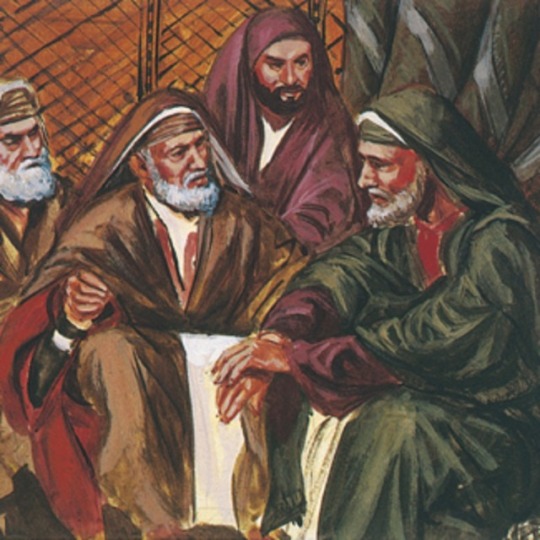
by J.R. Miller
Israel Asks for a King (1 Samuel 8)
It was when Samuel was old, that the people began to talk about wanting to have a king. It takes a great deal of grace to grow old sweetly and beautifully. It is not always possible to carry the alertness and energy of young manhood, into advanced years. There is much talk in our days about the "dead line," which seems to be set down at about fifty. It is not easy for a man who has crossed that line to get a position in business. Yet if we live wisely and rightly all our lives, old age ought to be the best of life. We certainly ought to make it beautiful and good, for our life is not finished until we come to its very last day.
We ought to be wiser when we are old - than ever we have been in any former years. We ought to have learned by experience. We ought to be better in every way - with more of God's peace in our hearts, with more gentleness and patience. We ought to have learned self-control and to be able to rule our own spirit better. We ought to have more love, more joy, more thoughtfulness, to be more considerate, to have more humility. The 'inner man' should be taller, stronger, Christlier. Old age never should be the dregs of the years, the mere cinder of a burnt-out life. One may not have the vigor and strenuousness of the mid-years - but one should be every way truer, richer-hearted, better. If the outward man has grown weaker, feebler - the inner man should be stronger.
We expect to see a good man's sons reproduce their father's nobleness and worth. They ought to walk in his ways. They ought to continue the life he has begun, to carry on the work he has started, to keep his name bright and add to its luster. A father has lofty hopes for his sons. He dreams brilliant dreams. He expects his sons to be the true inheritors of all for which he has toiled and sacrificed. It is a bitter disappointment to him when they fail him, when they are not ready to be his successors, when the business he has built up passes to other hands, because they cannot continue it.
"Samuel's sons did not walk in his ways. They turned aside after dishonest gain and accepted bribes and perverted justice." 1 Samuel 8:3. They had enjoyed every advantage. Their father had set before them a godly and consistent example. Samuel was not like Eli. To the very close there was not a single stain upon his name. There is no evidence, either, that he had failed in parental discipline, as Eli did. Yet in spite of all these advantages and privileges, Samuel's sons had forsaken the paths in which they had been brought up. Godliness is not hereditary; it does not necessarily descend from father to son. The fact that one has a godly parent - does not guarantee godliness in the child. A father may bring up his children most carefully, and yet he cannot compel them to follow after God, and they may turn entirely away.
Samuel's sons loved the world. The record says they turned aside after lucre. It takes a steady hand to carry a full cup. Many young men who would have lived well in lowly places - fail when they are promoted to positions of power. The sons of Samuel were not able to stand the temptations which office brought to them. Political positions are always full of peril. Many men who are upright in private life - have proved unable to resist the temptation to dishonesty in official places where money passed through their hands. Money seems to have been the root of the evil which destroyed these sons of Samuel. Even in those crude times there were men who were willing to pay for legislation or for judicial decisions, and these men prostituted their offices to the love of gain and sold their influence for money.
It is pathetic to see Samuel's old age saddened by the corruption of his sons. The children of godly men, owe it to their parents to live so as to bring honor and blessing upon them in their declining years. There are many ways of doing this - but the best is by living noble, beautiful lives, and being such men and women as their parents will be proud and happy to own before all the world.
There seems something most ungracious and ungrateful in the way the elders of Israel came to Samuel to tell him of the people's desire for a king. "They said unto him, Behold, you are old." The elders meant that Samuel's old age made him incapable or inefficient as a ruler. It was a broad hint to him that he would better lay down his authority and let them choose some other ruler. They seem to have forgotten that he had grown old in their service; that he had given his whole life to the cause of the nation, and that they owed him whatever of grandeur or real glory there was in their land. Their conduct towards Samuel was ungrateful in the extreme.
This fault is too common in our own days. We are lacking in reverence to the aged. We are too ready to ask them to step aside when they have grown grey in serving us, to make room for younger people to take up the work they have been doing. We ought to venerate old age, especially when it has ripened in ways of righteousness and self-denial for the good of others. No sight is more beautiful than that of a young person showing respect and homage to one who is old.
Yet there is another view of the case that we may not overlook. Old men cannot always retain their places. They must give way to others, who in turn shall take up the tasks they have done so long. The old ought not to be afraid of the young. The oncoming host should not terrify them. When we have done our part well - we should be glad to surrender our places to those who may carry on the work we have begun. All any man can do - is a little fragment of a great work, the laying of a few stones on the wall. We follow others, and still others will follow us. The old must recognize this law of life and should neither grieve nor complain when they are called to surrender their places to make way for those who will come after them.
There are few severer tests of the Christian spirit than this, and the old need special grace and a large measure of the mind of Christ, in order that they may meet the experience sweetly. The lesson of gratitude and deference towards those who have served well, is greatly needed - but so also is the lesson of submission and resignation in those whose work is complete. Sometimes an old man, after a life of nobleness and great usefulness, mars the beauty of his record by the ungracious way he leaves his place. If he is wise and recognizes the Divine law for advancing age, he will retire in such a way as to crown his work by the beauty of its closing, and make the influence of his last days a holy aftermath, in which the best things of all his years shall continue to live in the glow and ripeness of love.
The demand of the elders was very explicit: "Now appoint a king to lead us, such as all the other nations have." They wanted to be "in fashion". They were growing tired of their plain, old-fashioned kind of government, and longed for the pomp and splendor which other nations had about their government. At the bottom of it all, however, was a discontent with what God had given them, and a feeling that what others had was better. Besides, there was a worldly spirit which craved to he in the world's parade and fashion.
This same spirit is still alive. There are many professing children of God who look longingly at the world's fields and sigh to get over the fence to try the world's enjoyments. Many Christians are not satisfied with the spiritual things of grace for their portion - but crave to have what the world has. The hour was a very trying one for Samuel. He was displeased. Yet his conduct was very beautiful. This request of the people for a king hurt him sorely. It was a painful slight upon him. After all his lifetime of service, they had asked him to step aside because he was getting old. Samuel knew also that they had made this request in a wrong spirit - that they were also slighting God and rejecting Him.
The natural thing for Samuel would have been to answer the elders sharply, and tell them in plain language what he thought of their request. But instead of this, notice how nobly he bore himself. He would give no answer at all until he had carried the whole matter to the Lord. When others hurt us by their sharp speeches, by their ingratitude, or in any other way, or when they are about to do us harm by their acts - our first duty is prayer. God is far more deeply concerned in any matter that concerns us - than we ourselves can be. We do not know what His will may be about it. Perhaps the things we think should not be done at all - He may want to have done. Perhaps He wants us to submit to the wrong or the injustice. Perhaps our part in the work has been completed and God Himself would have another take our place. At least, we should always carry every such matter to Him and ask what His will is before we give any answer or do anything in return.
The example of Samuel in this case teaches us important lessons. The lack of gratitude and graciousness in the people and their elders - did not affect Samuel's bearing in the matter. We must be Christians, however unchristianly others may have done their part towards us. Then God had far more concern in the change the people desired than Samuel had. They were setting Samuel aside - but they were also setting God aside. It often happens even in church work, that people have to be superseded. They are not altogether satisfactory, and it seems wise that a change shall be made. Or there is personal animosity in the desire. Whatever the motive, we should never resent such changes, if they apply to us - but should accept them sweetly and cheerfully as Samuel did.
The Lord bade Samuel to let the people have their choice in the matter of the king. They were persistent in their demand - and God let them have their own way. The thing they asked for was not pleasing to Him - and yet it was granted. God sometimes grants men's prayers, even when what they ask - is not really the best thing for them. He sometimes permits things which He does not approve. Even God, with all His omnipotence, may not compel us to take His ways. According to the prophet Hosea, God says: "I gave Israel a king in my anger."
It is not safe to make demands of God in prayer, to pray insubmissively and rebelliously. The thing we take as by force from God - may not bring blessing. The true way to pray, is to lay our requests at the feet of God - and leave them there without undue urgency. We do not know what is best for us.
A pastor sat by the sick-bed of a child who seemed to be near death. Turning to the parents, he said: "We will pray to God for your child. What shall we ask Him to do?" After a few moments of silence the father said, amid his sobs: "We would not dare choose - leave it to Him." This is the only safe way to pray in such matters. The thing that seems to us most desirable - may be in reality the very worst thing we could get. Life may not be the best thing for our child. We know not what would lie before him if he lived. The thing that seems to us most desirable - may be in reality the very worst thing we could get. There is no wrong in our praying for money - but it must be in the spirit of Gethsemane: "Not my will - but may Your will be done."
In praying for our friends, we dare not dictate to God what they shall have, for we cannot tell what is best for them. Unsubmissive prayers are always wrong. And God may sometimes let us have what we are determined to have, and the receiving may prove an evil rather than a good to us!
The Lord reminded Samuel of the wrong the elders had done to Him also. Thus the matter concerned God even more than Samuel. We should learn a lesson of patience and forbearance towards others - from the way God bears with men's sins - perchance with our sins!
God is very patient with the wicked in all their sins. Why should not we likewise be patient with them? We are not their judges; they do not have to answer to us for their sins. We should show them God's patience.
#James Russell Miller#Devotional Hours Within the Bible#Israel Asks for a King#1 Samuel 8#February 17#2022
8 notes
·
View notes
Text
Personal Opinions on FFXIV Villains (in general order of appearance)
As a note, I will not be including any pre-A Realm Reborn villains (as I did not play the original Final Fantasy XIV) nor will I be including any one-off primals, raid bosses, etc. I will be trying to focus on villains as they appear in main or side storylines, in cut scenes, that have some over-arching influence on the story they participate in with something akin to a clear presence - Garleans, Ascians, and so on. Also SPOILERS SPOILERS SPOILERS.
Rhitahtyn sas Arvina
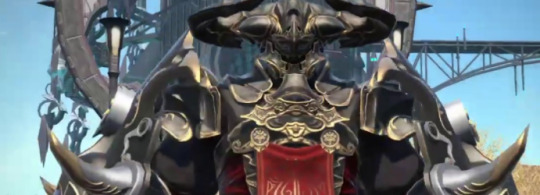
Rhitahtyn gets the shaft out of Gaius’ three main players in A Realm Reborn. A conscript from a Empire-conquered land who rose to power and respect, directly honored by Gaius himself, and possessing an even temper and noble ambition really helped to level out Nero and Livia’s general nonsense. Unfortunately, Rhitahtyn is provided almost no screen-time, development or exploration, and as years have passed, his in-game 8-man trial can now be completed in a regular synced party in mere seconds. He deserved a lot better than what he got, yet remained too sidelined to really leave me feeling invested in wanting to see what sort of story this character could be used to tell.
Livia sas Junius
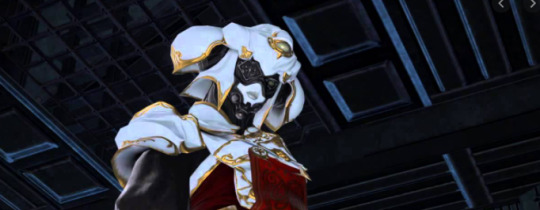
When first playing through A Realm Reborn my feelings on Livia were...tepid, but optimistic. Of Gaius’ three main players, Livia was easily the most active and ruthless, lacking the shady “long game” and self-serving ambitions of Nero or the more honorable, measured personality of Rhitahtyn. Suffice to say, the dawning (and then confirmed) realization that Livia’s sole motivation seeing the plan of the man she loved through to completion by any means, to the point of tunnel-visioned, murderous intent, was...disappointing. Add to that Livia was raised by Gaius in her backstory, the man being a father figure to her, and the romance motivation becomes even more unhinged (especially since it is largely considered to be a reciprocated romance, at least physically, by Gaius - barf)
Nero tol Scaeva
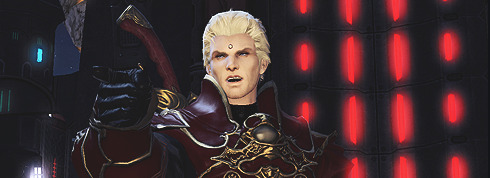
Nero has become a fan favourite character over the years, thanks to his continued development into Cid’s boyfriend foil rather than outright villain of the main storyline. This development was easy to spot early enough though, as it was clear Nero’s fealty to Gaius was largely self-serving. He didn’t care much about conquering Eorzea or felling primals/eikons - he just wanted to show that he possessed the brilliance to build weapons capable of doing so. His speech/squabble with Cid during the Praetorium sequence paints that picture even more clearly if the players missed the not-so-subtle implications for Nero’s character already. The man lived, breathed and seethed with inferiority when compared to Cid, and in the end he did ultimately prove his engineering mastery, even if the Warrior of Light took it (and him) down. Ultimately though, Nero serves as a much better supporting and “redeemed” character than a villain, so I do have to rank him pretty low.
Gaius van Baelsar

Aside from whatever...weird...thing was going on between him and Livia (again - barf), Gaius in A Realm Reborn was a pretty solid villain, with clear-cut motivations that I actually understood, and begrudgingly agreed with to a small extent. As legatus, Gaius was still the tyrannical arm of the Garlean Empire, but a level-headed one who was more interested with the purging of the primal/eikon threat from Eorzea than subjugating other peoples. Further development of this character into something of an anti-hero and glimpses of how other characters viewed him in flashbacks in later expansions ends up providing his A Realm Reborn rendition with more strength in retrospect. The heads of the three city-states deciding to accept Gaius off to willingly join the Empire is a pretty good sticking point for the validity of his plan as well. Ultima Weapon is...you know, pretty impossible for Ul’dah, Gridania and Limsa Lominsa to face down if they refuse, but more enticing is its ability to, indeed, single-handedly defeat primals/eikons - something the city-states desperately need at their disposal, having been plagued by such threats constantly, for years and years.
Gaius cuts a pretty direct swath to the truth of the Twelve as well - they’re no different than the primals/eikons he seeks to eradicate, and the more stock Eorzeans put into them, the more empowered they become should someone ever try to summon one, making Eorzeans no better than the beastmen and their ‘gods’. Join the Empire and have protection from such powers, and put faith into the leadership of man, versus that of fictional deities that can be given terrifying form...in the world of Final Fantasy XIV, that’s not a terrible proposition. But it would still subject thousands of people to the Empire’s tyranny, so even if Gaius has the oft-coveted ‘Point’ that most villains wish they had, he still must be stopped. Eorzea will simply find other ways to endure the primal/eikon threat rather than bend the knee, and I like that defiant angle the Warrior of Light represents to counter Gaius’ character. Also, Ascian meddling and Hydaelyn shenanigans, sure, but I don’t feel that takes away from the core conflict that Gaius presents. He was a good villain, and I’m happy to see him return and go through the motions of penance for his past deeds and aid the supporting cast now, elevating him even higher into a good character, in general.
Lahabrea
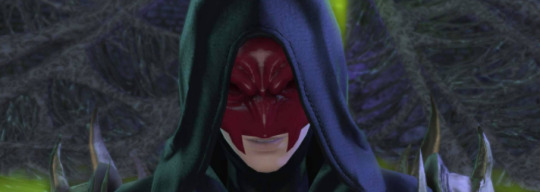
I admit I have a soft spot for Lahabrea, only because he seems to be a universal punching bag for heroes and villains alike in Final Fantasy XIV. He lacks the more subdued, long-term planning of Elidibus or the explored nuance and sympathy of Emet-Selch - he’s sort of the odd one out between the trifecta that make up the unsundered Ascians. Just a blindly-tempered zealot of Zodiark, seemingly more enthused by the ancient primal’s return than the promise of the world being set back to how it was before The Final Days. Even the other Ascians don’t seem to like Lahabrea that much - Elidibus seems keenly aware that Lahabrea has gone off the deep end, constantly needing reminders and wrangling-in to keep the plan in motion. But I will admit, he serves his purpose well enough, and the additional side-story that reveals that Lahabrea was a brilliant scholar unmatched in the Amaurotine field of ‘phantom creation’ was a nice touch to explain why he’s pretty dang good at getting people to try and summon primals and conjuring or corrupting monsters himself. By no effort of Square Enix themselves, I sort of feel bad for the guy. He really was just Doing His Best, and getting no respect for it. His end was also anti-climatic, but by the time it happened, there were far more interesting characters and stories to tell, and he was unnecessary - it was just better this way, Lahabrea.
Nabriales

This one-bit player served one substantial purpose, and it was to see an Ascian get obliterated permanently and thus provide the means and understanding to battle Ascians in the future. Except that the cost to do so was a throw-away villain, a throw-away damsel-in-distress 8-man trial, and turning Moenbrya, a character with a lot of potential to be great, into a throw-away character who has to make an untimely sacrifice because the script says so. Nabriales you’re boring, you’re bad, you’re a waste of time and your mutton chops are dumb as hell.
Ilberd Feare
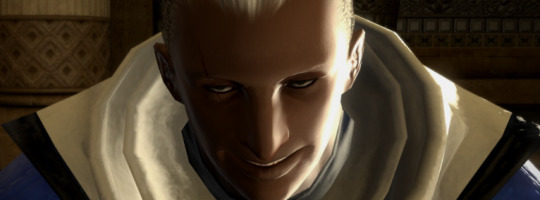
You know what, I like this villain. I absolutely want to punch his face in, but I figure getting that sort of rise out of me on sight is intended, since, you know: villain. His motivations aren’t bad either, even if his methods are deplorable. The speech he gives at the very end of A Realm Reborn to rile up Raubahn is pretty effective too. Despite both being refugees of Ala Mhigo, Raubahn fought his way to wealth and status, and Ilberd was never afforded that chance, or at least never quite managed. Raubahn pledged himself more to Ul’dah and the Immortal Flames with his new privileges, however, and Ilberd was perhaps right to resent that, with Ala Mhigo still under the yoke of the Empire, and so many refugees left to flounder in The Black Shroud and Thanalan both, Raubahn seemingly unwilling to step in. Ilberd saw the opportunity to change the status quo and took it, and proceeded to rally others to reclaim Ala Mhigo. If the city-states would not help, then they would be forced to help, and for all his dirty tactics, punch-able face and Shinryu-summoning finale, Ilberd’s plan did work: he forced the hand of the city-states to fight against the Empire to reclaim Ala Mhigo, and did indeed remind Raubahn and other passive Ala Mhigans that there was still an important job to do. So, good job Ilberd. Gold star. Now perish.
Teledji Adeledji
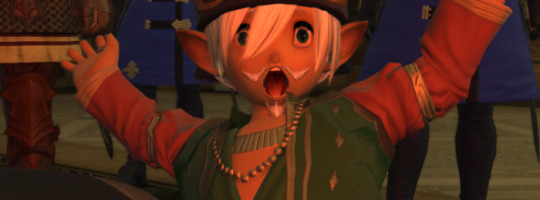
I thought the politics at the very end of A Realm Reborn were intriguing, and Teledji’s heel-turn pretty fun, since of all the Monetarists, he seemed to be painted as the most reasonable. Though I found his game plan a bit...suspect. Yes, a poisoned goblet assassination attempt on the Sultana that he could frame on someone else, while usurping control of the Crystal Braves so he could make a bid for full Monetarist control of Ul’dah (with him at the helm) makes sense on paper, but I’m not sure why he sought to frame the Warrior of Light for it, and implicate the Scions either. While it’s true that the Warrior and the Scions would be an obstacle and want to investigate the death, and would prove tenacious foes, if you think about the scenario a bit more, it seems unnecessary. The Warrior and Scion efforts were likely going to start swinging towards Ishgard and the Dragonsong War, to better embellish the northern city-state’s relations with the Eorzean Alliance, nor are the Warrior or Scions people you’d want to make an enemy, especially with the Warrior being one of the only people who can defeat primals (a very active threat in Thanalan).
Framing Lolorito would have been a wiser idea, as he was already disliked and untrustworthy in the eyes of many, powerful and dangerous to compete with though he is. If Lolorito had been framed, Raubahn and the Scions may not have questioned it, and Teledji could have enjoyed planting himself in the eye of the power vacuum that was to come while the Warrior of Light focused their energy up north. Instead, Teledji bet on the wrong chocobo and paid dearly for it - his plan fell apart (and so did he) in more ways than he could anticipate, but on the whole? This was a pretty intriguing and entertaining storyline, I enjoyed it.
Lady Iceheart / Ysayle Dangoulain

I debated putting Ysayle on this list because by the first act of Heavensward, she’s not a villain - but, she certainly was in A Realm Reborn and going into Heavensward, so we might as well just keep representing how good Heavensward is and include her here. Aside from Minfillia, this is one of the only ever characters you meet early(ish) who shares The Echo with the Warrior of Light. Unlike Minfillia or the Warrior, though, Ysayle doesn’t really adhere to the call of Hydaelyn. Instead, her powers allowed her to hear and learn the truth of Ishgard’s history: that it was a lie, and that King Thordan broke the peace in a bid for power for Ishgard, turning Nidhogg to rage and setting the Dragonsong War into motion. Having witnessed Ishgard’s cruelty at a young age when her home was destroyed by snow and ice after the Seventh Umbral Calamity, and knowing what she knew and maintaining close bonds with dragons throughout her life, it’s sort of easy to see why Ysayle would be set upon the path she is. She wishes to end the war much like how Thordan does: ending it, with the dragons as the victors.
Her slap in the face is when she confronts Hraesvelgr though, her bid to sort of not only take the form of Saint Shiva but embody her memory being dismissed as a pale imitation. Saint Shiva wished for true peace, whereas Ysayle demands it through bloodshed - she realizes this, and changes her current course. This is why I debated to list her as a villain, because her gradual change into a supporting character and hero is a logical conclusion as she and Heavensward’s story develops. She starts a villain and dies a hero.
Igeyorhm
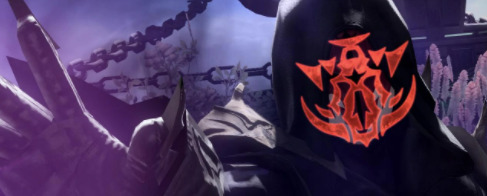
Full disclosure: I completely forgot this character existed. And I still don’t actually know why they exist. They’re a second to Lahabrea during the events of Heavensward, and is easily shut down by the Warrior of Light before being annihilated permanently by Thordan. Despite this, I don’t find their existence as offensive as Nabriales’, so...that counts for something.
Archbishop Thordan VII

When I first encountered Thordan (”pope grandpa”, if you will), I thought “oh, he’s evil”, because “church bad” isn’t exactly and uncommon trope and it’s apparent that Ishgard is a broken and unjust society, with this man sitting at the highest seat of power and consorting with Ascians. Yet to my surprise Thordan was...pretty reasonable. At least to start. He makes his audience with the Ascians known and seems unaffected by them and their schemes, is polite and cordial to the Warrior of Light...he doesn’t seem so bad. But the gut feeling remains, and slowly builds as Thordan’s true plan is revealed, becoming a primal-esque deity. And much like Nidhogg, I do get his motivations. Trying to broker peace with the dragons, to him, is just not going to happen - in fact, it’s insulting to ask dragons and Ishgardians both to make a bid for it, when so many people have died and live with the burden of hatred and grief. His solution is more direct: end the war entirely, by winning it for Ishgard.
After assuming his new form and powers, him and his Heavensward have the power to thwart any dragons that oppose them, perhaps even Nidhogg himself if the dreadwrym were to re-appear. Fueled by the generations’-worth of prayers from the Ishgardian population, Thordan was set on ending the war and ousting the dragons from the land, ushering in peace and prosperity. But the Ishgard he sought to protect and defend was built on a history spun of bloodshed and lies, and the dragons were not the true enemy and did not deserve to be put to the sword. Thordan’s plan would have worked in the way he envisioned it, and he made a good argument for it, even if it was ultimately wrong, and that’s a good villain.
Nidhogg
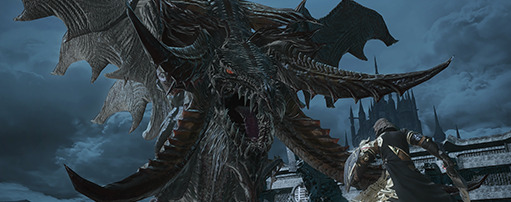
Having come to Final Fantasy XIV from World of Warcraft, a giant, scary black dragon that rants on and on about suffering and misery and pain and vengeance was something of a red flag for a Very Bad Story. Imagine my surprise when Nidhogg was given the screen-time to be properly fleshed out and explored, his motivations and hatred more sympathetically-human than his giant dragon body would have one believe, his presence menacing and well-paced, and his overall being representing the true, dark heart of the Dragonsong War: the cycle of hatred. For dragons, centuries are like days, and the pain Nidhogg feels is no less than what he felt when the Ishgardians brutally broke their pact. Because of this, with each re-emergence of him and his brood, the wheel of suffering turns anew, breathing new hate-filled life into the ongoing Dragonsong War, generation to generation. Time has no effect on his turmoil, and his existence ensures that no other Ishgardians will ever be able to move on from the war either, even as generations continue on.
I find Estinien being consumed by Nidhogg’s rage very thematic as well, Estinien truly embodying the countering hatred the Ishgardians feel towards the dragons, and it makes the final trial with Nidhogg bittersweet. He defeats Hraesvelgr, because as long as Nidhogg exists even the brightest hope for peace will be squashed under the cycle of malice and war. The Warrior of Light must put him down because he cannot be saved - but Estinien still can, and can choose to move on and pursue the peace that Nihogg strived to prevent and Ysayle died to see come to fruition. And he does, and it’s touching, and Heavensward is SO FUCKING GOOD I LOVE THIS EXPANSION.
Quickthinx Allthoughts
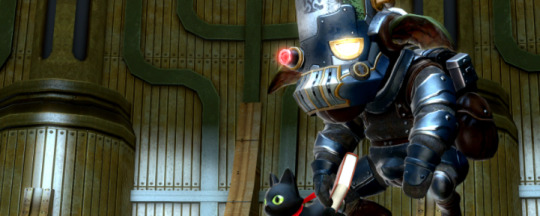
I don’t care much for timey-wimey storylines, but I found the Alexander plot easy enough to follow, and the timeloop it creates to be manageable. The truth about the Enigma Codex and the journal Quickthinx has isn’t exactly hard to figure out though once time travel becomes a part of the plot, and beyond beind a fun goblin with a cute kitty cat friend...there’s just not much in the way of compelling character writing here for this gobbo.
Diabolos
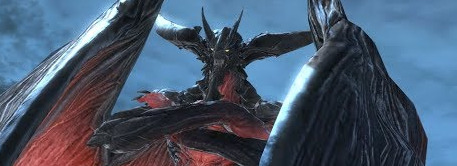
Big ancient demon is revived and wants to wreak havoc. Uninspiring, but its also not necessary for Diabolos to be anything more than what he is either. The heart of the Void Ark storyline is the tribulations of Cait Sith, the sky pirates and the history of the Mhachi, Diabolos just being an excuse to explore those characters and lore.
Regula van Hydrus
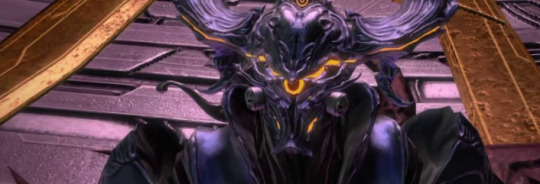
Regula deserved better damnit. This is the last Garlean villain with nuance and humanity before Stormblood turns everyone who is so much as associated with the Garlean Empire into a cartoonishly-evil, absolutely twisted, reprehensible confusing mess of a person.
Fordola rem Lupis
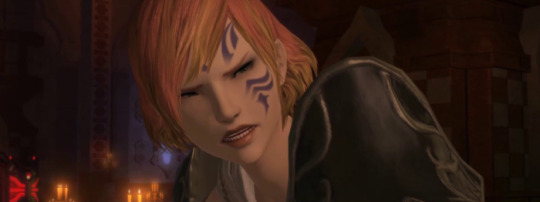
Stormblood has a lot of story, pacing and character problems. A lot. It has its moments and some people love this expansion, but I do not and its villains are a very large reason why that is. Fordola, for example, had the potential to be quite interesting. She was raised to believe in what her father did: that Gaius and the Empire were not all bad, and then watched her father die trying to protect her from angry, almost barbaric Ala Mhigans who decided that pelting a little girl with rocks because her parents were Empire-sympathizers and supporters was an okay thing to do (as the Garlean soldiers just watched on and let it happen without intervening because they didn’t feel like it - a fact that Fordola knows and remembers). You would think this event would have a sort of polarizing effect on her, feeling betrayed by both her people and the Empire her father believed in, feeling caught in the middle, in need of finding her identity and sense of self. Instead she...basically throws her entire stock in with the Empire, deciding that if she’s a good little soldier for the Empire, then Garleans will have to change their minds about Ala Mhigans and respect them because, see, look: an Ala Mhigan is a respected Garlean asset.
Except this backfires over, and over, her Ala Mhigan team nothing more than vicious dogs that never bite the hand that feeds them, turning their teeth on their own people instead. Fordola is constantly belittled and ridiculed for her heritage and even her gender by the Garleans, and at no point does she ever stop and go “wow maybe the Empire sucks hot ass and I’ve been terribly wrong about my motives this whole time”. And yet, no...Zenos offers her power in some magitek-aether experiment, she kills her own Skulls team, she finished the expansion jailed for her crimes, believing until the very end that the Garleans will win (they did not). She utilizes her anti-primal abilities once, and vanishes from the plot entirely, only to re-appear in a bad side-story where the Immortal Flames have her hooked up to some penalty-of-death submission collar so she doesn’t act out so they can use her synthetic Echo abilities to fight a re-summoned Ifrit.
Bad character, bad writing, and a waste of her new, game-changing anti-primal abilities.
Grynewaht pyr Arvina
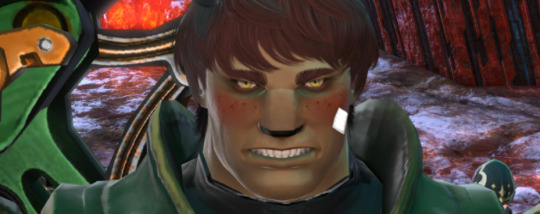
This is such...a stupid character. His design, his voice and dialogue...I can’t tell what Grynewaht is supposed to be. Is he comedic relief? Because he’s not funny. Is he a character that you’re supposed to pity or despise? Because I felt nothing towards him. Is he supposed to be a rival? Because...no. I had to look up what his name was. The only thing I can clearly remember about him is that he was the final boss of the Doma Castle 4-man dungeon. That’s it. If you removed him from the plot entirely, nothing of value would be lost.
Yotsuyu goe Brutus
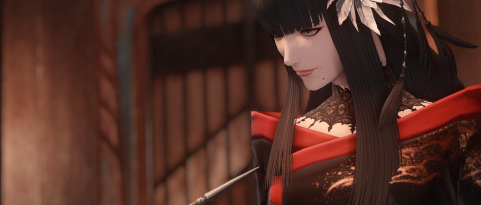
Between the two female villains of Stormblood, Yotsuyu is the more popular. It’s easy to see why: she has a cool design and a lot more screen-time and development, with a big 8-man trial to finish things off. But like Fordola, something is just off about her writing.
I don’t understand her motives or how she even came to feel the way she does about Doma, specificially. And anything bad that could happen to her, has happened to her. She suffered an abusive childhood under her adoptive parents, was sold off to an abusive husband, then sold off again to a brothel after her husband died to repay his debts. She later became a spy for the Garleans, rose in rank and was appointed acting viceroy of Doma, to keep the masses terrified and under her heel. At first, it seems pretty reasonable for her to turn against Doma, and lash out as she does on its people - her Doman upbringing left her used, abused and powerless, and with the Garleans she found power and strength. But this reading falls apart when you quickly realize that Doma was already occupied by the Garleans during the course of her upbringing, her family obedient to the Empire and her suffering just as much the fault of the Garleans. There’s an argument to also be made that not enough time was really spent portraying Doma as the disgusting place Yotsuyu sees it, as from the onset of Stormblood’s story journey into the Far East, Domans are only ever portrayed as a terrified, broken people, scared of the Garleans and Yotsuyu. I also don’t personally care for “character was abused, so now they’re sadistic and crazy” clichés either.
What does work well for Yotsuyu is the theme of power and control. Yotsuyu is a woman who lived a life not her own, weak and frail, until she obtained power. Now that she has it, her drive is to do anything to maintain it and survive - yet for some reason the story is written in such a way as to downplay this much stronger theme of her character, and play up this slightly confusing, all-consuming hatred for Doma instead. Her transformation into Tsukiyomi is also a bit odd (though decently thematic, with her ‘cold, uncaring and distant as the moon’ comparison), with not enough time paid to explore her understanding of Doman deities and why the mirror would trigger this change (and why would she even keep Doman deities in her mind, with her supposed hatred of Doma?)
I also take some issue with her “Tsuyu” arc, where she reverts back to the last time she was ever truly good or innocent, and has the personality of a child while still being an adult woman (and suffering amnesia). I find these infantilizing tropes pretty offensive, especially when Yotsuyu’s arc here is largely just to reinforce and reiterate what cartoonishly terrible people her family were, and provide Gosetsu with some development instead. Aside from killing Asahi and having a cathartic death herself, everything about Yotsuyu just baffles me. Every time I think I like something about her, athe bad writing twists it around.
Zenos yae Galvus
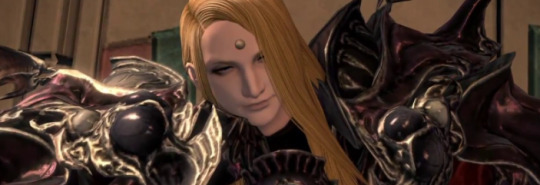
I don’t like Zenos, he’s a bad character, and I hate that Square Enix decided this limp-haired sullen-faced clown was going to be their poster-boy villain for Final Fantasy XIV.
What is the appeal of this character? Yeah, some people find him attractive. I don’t, but I also didn’t find Sephiroth attractive so, okay, whatever - like what you like I guess. But what else does Zenos have going on besides people seeming to think he’s their buff bishonen thicc daddy or whatever the kids are saying these days? His entire character can be summed up in one sentence:
“While the Warrior of Light was practicing empathy, Zenos studied The Blade.”
He’s a Garlean lordling with a bland and cold upbringing who likes katanas and blood sport. That’s it. He’s a sociopath, finding no joy or meaning in life for whatever reason: he just wants to collect Cool Swords and push his bizarre love-hate fight narrative on the Warrior of Light. Because they are opposites, you see: the Warrior of Light is a cardboard cut out of a Good Guy and Zenos is a cardboard cut out of a Bad Guy. He’s not even entertaining about it. He doesn’t want to watch the world burn, he just wants to fight the Warrior because the battle will make him Feel Something. Meanwhile, all I feel whenever I see him in-game, either in a cut-scene or when I’m locked in an unskippable “survive the drawn-out battle!” sequence with him, is a groan coming on. And sometimes villains who are evil just for the sake of it can be fun! But Zenos is not fun - he’s dull, he doesn’t get me hyped up for a fight...I feel nothing.
When he died after using his uber-synthetic Echo to possess Shinryu by taking his own life I thought, “well, at least that’s over” and I felt relieved. And then he came back, bigger and worse than ever! Yippee! I love confusing, unrelatable, boring villains who are recurring. Whatever Square Enix wants to do with Zenos, they need to hurry up and get it done. I care so little about him and just want to explore other stories and characters. I’m assuming he’s going to like, possess Zodiark or something, and then the Warrior will possess Hydaelyn, and there will be some big anime light fight showdown where Zodiark and Hydaelyn both shatter for good and Zenos dies and the Warrior lives another day and uuuugggghhh. How the hell did an expansion like Stormblood follow up Heavensward? Who let this happen?
Asahi sas Brutus

Bowl-cut twink hates his sister because he’s a Zenos fanboy and is angry Yotsuyu got all of Zenos’ attention instead of him. Filled with spite and piss, cartoonishly evil just like everyone associated with Yotsuyu or the Empire in Stormblood. Rest in pieces you little shit.
Varis zos Galvus
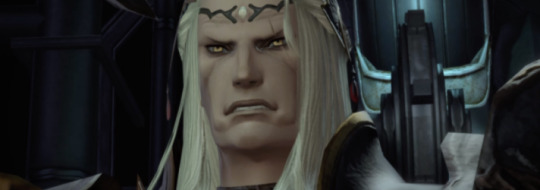
I’m lukewarm on Varis. He’s a better villain than Zenos, but that’s like saying a flat three-day-old glass of soda is better than sewage water. The bar is set very, very low. He’s ruthless, but not entirely unfair in his thought processes. Hell, he doesn’t even seem to like his own son (and really, if Zenos was my kid, I wouldn’t like him either). But Varis is a bit too...static, in my opinion. He doesn’t feel like a major player, and his batshit “let’s all just burn so the world resets and we can stick it to the Ascians” is pretty asinine and plays so transparently into the Ascian’s hands. I was originally bummed that Zenos killed him pretty unspectacularly, but...like with Lahabrea, it was probably better this way.
Omega

I don’t have much to say about this villain, really. The heart of the Omegascape storyline hinges on Cid, Nero, Alpha and the abstract concept of free will and accepting imperfection. It’s almost hard to say if Omega really is a villain, simply acting out a series of programs and statistics in a cold, robotic way, not really with malicious intent, so I think where Omega sort of shines is just as a being to build this sort of story off of, and provide a lot of fun boss fights as well.
Ran’jit
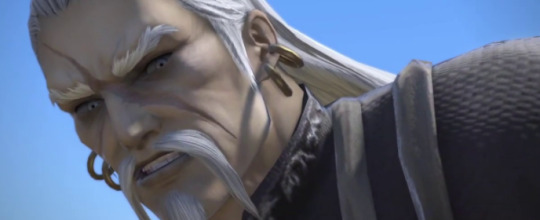
I had no strong opinions on Ran’jit for a long time, so I guess he improved for me as I now have An Opinion of him. He’s fine. He’s an okay villain. His Zenos-esque “survive the timer” encounters are annoying, but I find his persistence and presence more inspiring than any time crummy ol’ Zenos showed up. The biggest issue with Ran’jit is the lack of time devoted to developing him. This is a man who lost his home in the Flood of Light (which was the First’s equivalent to the Source’s Far East), and has essentially trained and raised numerous Minfillia reincarnations to battle Sin Eaters, just to watch these poor girls he saw as his own daughters die and die and die again. That cycle of loss would break down anyone, and make Vauthry’s postulations of paradise in Eulmore until the end finally comes appealing. Ran’jit pursues the Scions and Minfillia/Ryne not because he’s resolute in following orders, but because he just wants to bring this one psuedo-daughter back and keep her safe - something he could never do for the others who came and went in his tenure.
Naturally, this protectiveness leads to giving in to Vauthry’s nihilistic promises and stifles Minfillia/Ryne as a person. Thancred eventually learns to let the Minfillia he knew go so that Ryne could floruish into her own person - she was not ‘his’ Minfillia and it was terrible of him to ever impose that upon her. But where Thancred can move on and let Ryne develop into the wonderful person she is, Ran’jit cannot. And I’m disappointed this aspect of his character couldn’t be more at the forefront of his narrative.
Vauthry

If you ask me, this is more in line with how I figured Zenos might be. Vauthry lived a life or privilege and power, a child born of divine providence with no true regard for life, just his own desires. He’s spoiled and unreasonable, but his nihilism isn’t really nonsensical in the world of the First. All but a fraction of the world is destroyed, and Sin Eaters are a constant, devastating threat, so why not just relax in luxury, in the safety of Vauthry’s control over the monsters, and live in peace until the world truly ends? The battle against the Sin Eaters is exhausting and has no hope of victory anyway (until the Warrior of Light/Darkness arrives, that is). Even without the meol subplot, it makes sense why so many would flock to Eulmore once Vauthry takes over. Goofy as he can be, I do think Vauthry’s embodiment of just giving in to nihilism, hedonism and annihilation stands as a good thematic contrast to Shadowbringers strong themes of stubbornly striving for hope in even the darkest, bleakest hour. His trial is also fun and a slight swerve. All the Light Wardens up to that point had been monstrous, and Sin Eater transformations the thing of nightmares (Tesleen), so to see Vauthry take on the form of Innocence (ironically appropriate, as he truly believes he is blameless in all he has done) and become a golden-haired, angelic being of beauty - how he likely has always seen himself - is very entertaining, and defeating him feels great.
Emet-Selch / Solus zos Galvus / Hades
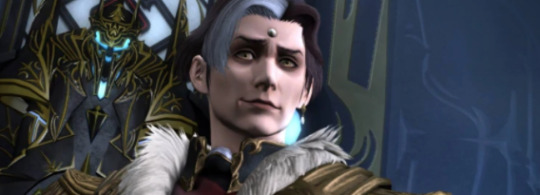
Ah yes. The Big One. Most people like Emet-Selch and his involvement in Shadowbringers. He’s sardonic, he’s entertaining, he’s honest, he’s explored, and he’s even sympathetic. The revelation of how Zodiark (and Hydaelyn) came to be, Amaurot and The Final Days is truly tragic. Emet and the rest of the Convocation were trying to save their world, and the cost was staggering - the lives of so many of their own, their minds, and eventually even their own world in the Amaurotine schism that followed. Being able to see a shadow of what Amaurot and its people were like really helps drive home the sorrow of it all, and Emet himself admits that he did try to learn to appreciate what the fragmented world had become. He’s also one of the most “successful” villains in Final Fantasy XIV - his intertwined association with death and masterful ability to raise up and lead empires like the ancient Allagans and modern Garleans to their self-destructing, Calamity-inducing downfalls (of which he was almost successful did with Varis and the Black Rose in the latter’s case) is pretty impressive as far as villainous plans and activity is concerned. Being forced to work alongside him in Shadowbringers because your goals are aligned while attempting to guard yourself from his inevitable schemes - which he’s pretty blunt about admitting he has - is an interesting way to develop him as a villain too. He spends most of Shadowbringers actually helping you rather than outright antagonizing you.
His conundrum is sympathetic as well, if not entirely relatable. If you had the ability to bring back your world, your friends and loved ones, at the cost of countless lives that are trivial in the grand scheme of the cosmos and start again, anew, in a better world that could repair and rebuild, would you do it? Tempered by Zodiark or not, Emet would, and while I don’t agree with him, I don’t entirely blame him either, for feeling how he does. Similar to Ran’jit and Vauthry too, Emet is nihilistic: he clings to something long-gone and will burn the current world down to get it back. To him, the Rejoining and Zodiark’s return is inevitable, and people like the Warrior of Light/Darkness are futile, frustating obstacles that cannot understand not only his plans, but just how he feels. They don’t remember what they lost. Emet does.
And yet in his final moments, Emet seems at peace. He seems to realize, as he is fading into oblivion, that the Warrior of Light/Darkness isn’t just the reincarnation of Azem, but what Azem believed in that made Azem part from the Convocation. Fractured life is still life, and Azem believed that the world and its beings was worth learning about, loving and protecting, capable of great things even when faced with insurmountable odds. The last act of good will Emet can do after requesting that the Warrior not forget about Amaurot, is to free the Warrior from Elidibus’ binds so that the last unsundered Ascian can be put to rest at last. It’s a very emotional throughline for Emet’s character, rather than a more logical one, but it works very, very well and really helps push Shadowbringers into that amazing high its story can get to.
Elidibus

I never liked Elidibus all that much for the longest time. It’s not that his character was “bad’, per se - he’s polite, diplomatic, and enigmatic, providing a much more leveled, intriguing villain to counter-act Lahabrea’s more active plays and cackling. But Elidibus’ long game always left me sort of wanting: I was never really sure what he was trying to accomplish expansion to expansion and how it related to the Rejoining that would bring about Zodiark. His plans also seemed to just regularly...fall through. Sending the Warriors of Darkness to antagonize the Warrior of Light in the Source ended up bringing about the halt of the Flood of Light on the First entirely. Picking up Zenos’ body and squashing Garlemald uprisings while nudging Varis to make and use the Black Rose was promptly halted by the true Zenos making an unspectacular return. I don’t know, I just feel like any plan Elidibus sets into motion gets stopped before it really gets started.
My opinion of him did change, however, during the course of the Shadowbringers expansion. Being the heart of Zodiark, manifesting as the First’s...uhh, first, Warrior of Light, summoning them from across the other shards to wreak havoc and empower himself, only to finally be put out of his misery not just be the true Warrior of Light/Darkness, but Emet-Selch’s last act of will and revealing that he had been an over-working, sad youth who just wanted to save the world he knew was...well, sad. And his first (and last) real gameplay with the various hero summonings was a pretty amazing set piece too, though it also tells me how devastating Elidibus could have been earlier on if he’d taken a more pro-active approach, access to the Crystal Tower notwithstanding.
Valens van Varro
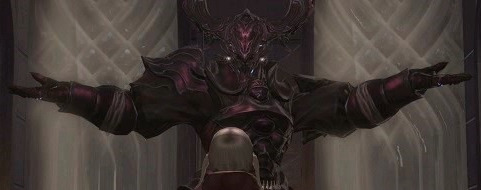
Much like how I wanted to punch Ilberd, because Ilberd is a deplorable person but an effective villain with decent motivations, Valens is just...I just want to punch him, in general. He’s just Disgusting On Purpose. And since we still haven’t shaken Stormblood’s insistence that Garleans are Evil So Evil Oh My God Evil You Guys they’re trotted out a demented borderline sex-offender who forces his child wards to brand subjects who are out of line with red-hot irons. Valens is...entertaining, I guess, in that regard. And Valens does serve as an appropriate counter-part to Gaius in this storyline, the themes of which seem to largely deal with fatherhood and penance for past misdeeds. I just...really miss Garlean villains with nuance.
Fandaniel

Oh god damnit Asahi is back. Square Enix stop doing this, stop bringing back bad characters. Though it is unfair to say Fandaniel is anything like Asahi. Oh sure, he’s using Asahi’s body (and therefore the Brutus’ family inheritance to fund his machinations), he fawns over Zenos, and he’s cartoonishly evil, but at least this go around there’s a certain...goofy charm to it. Fandaniel is a sundered Ascian - he doesn’t care about the Rejoining or Zodiark, he’s aware that he’s a broken being and he is, quite frankly, loving it. He lays his intent out pretty plainly to the Warrior of Light/Darkness: he’s evil, he loves destruction, and he’s doing it because that’s just what he feels like doing. Don’t reason with him, don’t try to understand him, just fight back and cry about it. On some basic level I appreciate that brutal honesty, so much so that I’m comfortable writing my thoughts about him now because I don’t think they’re going to change. What you see is what you get with Fandaniel, and he’s just having such a good time. He’s a terribly-written villain but gosh darnit I just can’t bring myself to hate him.
#don't @ me zenos fans or i will always win need rolls on mount drops by one point in your queues#ffxiv
74 notes
·
View notes
Text
All the Love {Thranduil x Reader Oneshot}
Requested by: @queenofmankind
Wordcount: 3296
Summary:You show up uninvited to a grand affair, hosted by King Thranduil. There’s been some things left unspoken.
No matter how ornate your gown, or how beautifully braided your hair was, attention always went to the necklace that rested between your breasts. Silver, twisted into branches to make a teardrop like shape, framed the four pointed star within. It hung off of a delicate looking chain, but it was one which was extremely hard to break. Throughout your long life, it had never broken once, not even when you were a child and not as careful as perhaps you should have been. It was not only a beautiful piece of jewelry, but it was a sign of your life force. It was realized that if you were ever seen without it, it meant that you had fallen in love. Many elves had tried to have the privilege by courting you, but you remained stubborn and so the necklace had stayed. There was no one you had yet met who you would give your heart, your life to. The keyword in this being yet.

The rain was falling when you reached Mirkwood. You never minded the rain, but nonetheless, it was a relief when you were under the thick canopy of trees rather than out in the open. It was only when you saw the lights floating among the trees that you even realized you had reached your destination. A blonde haired elf approached, his hair as straight as the tree trunks around you. “Welcome, Lady y/n,” He said with a bow of his head. You chuckled, your fingers playing at your bottom lip.
“After all of the playing that we had done while you were a child?” You asked, raising an eyebrow. “You should know better than to call me a Lady. We both know I’ve never acted like one.”
“Calling you a mudcrab wouldn’t have been as nice a greeting,” Legolas said with a smile, welcoming you into his arms. He still smelled of the deep forests, you noticed. Your oldest friend had not changed much over the years, though perhaps he had gotten a little more serious. It seems like it had just been yesterday when you had been one of his carers, and walked him through these very woods to help him appreciate nature. It was something that he was born with, but you had helped him to look beyond the trees. To respect the soil as well as the roots, and the birds as well as the leaves.
“Might have gotten a few looks for that, you’re right,” You smiled. You weren’t opposed to getting dirty when you went on your little adventures. It was why he called you mud crab - because you would wander into the lakes and come back looking like some sort of creature. He let go of you, and you let go of him, once the timing was on the verge of being inappropriate. “Thank you for inviting me.”
“He’d want you to be here,” Legolas said, taking you from your guards to lead you to where you would be staying.
“He still has no idea, does he?”
“He might. One of his spies might have already told him that you’re here.” Legolas was, of course, talking about his father. Thranduil, King of Mirkwood. The most noble and regal elf that you had known, except for perhaps Elrond. “He claims to know everything that goes on in here, but we still have some secrets.”
“That’s good. I would hate for him to know what we used to call him,” You whispered the last bit in case there were, indeed, spies about. Legolas smiled, and stopped in front of a archway.
“This will be your room,” He told you, bowing his head as you walked inside. It was a bit dark, but airy. Little fireflies were buzzing their way around, landing on the wooden headboard. Not much had changed in the millenia that you had been away. You could well recognize that it was the same room you used to use.
“Of course,” You said, your guard coming behind you, bearing your things. He started to unpack on your behalf. Gowns came out of your bags and were hung from a thin but strong branch, coming in from the outside. An owl flew in and perched on it, keeping its wide eyes on what was happening. “Where is your father now?”
“There’s a concert in the main hall. The first of many, I expect. I remember the celebrations for his 6000th birthday, and there was a lot to sit through. This year is meant to be more spectacular.”
“Well, it’s not everyday that a King makes it to seven thousand years old, now is it?” You said with a faint smile. You had come for the last large birthday, and the one before that. Back in the days when there was a Queen, Legolas’s mother, before she had passed. You had been a friend of hers from childhood. That was why you were selected to be one of her son’s caregivers after she was gone. You could tell him stories that Thranduil could not, and help him to forge a relationship with his dead mother. “I’ll freshen up and then I’ll go down. See if I can give him a little surprise.”
“I’ll be watching for you,” Legolas said with a grin. He left you and your guards to prepare for the night ahead. The first thing that you did was change out of your traveling attire into a more respectable gown. You chose something in a muted gold, floor length, with a slit in the front to make walking easier. It was a bit low on the chest to show off your necklace, but had long sleeves so it was still modest. With your hair tumbling down, you thought it was most appropriate for the beginning of a long birthday festival. Your guards gazed as you finished getting ready, bringing on a sort of confidence in you. You weren’t one one of the royals, but rather the daughter of a noble and thus you didn’t get much attention. You were only invited to this because of Legolas but - perhaps, you might look like you belong.
“You look beautiful, y/n,” Your closest friend and bodyguard told you, taking a seat on the floor. There would be more than enough protection in the concert hall. He and the few others would stay in your room until you returned, then find lodgings as close as they could be.
“Thank you,” You said with a curtsy. You wished them all a good night, then followed the few stragglers left to the grand hall. It was the sound of the music that guided you more than the elves. It was far from happy, but rather, a tragic sort of song, a longing sound coming from violins. Leave it to Thranduil to be dramatic.
You spotted the King as soon as you walked inside. He was sitting on his throne, hair draped over his shoulders, attention on the band in front of him. Standing to his right was Legolas, with his hands clasped in front of him, playing the part of the Prince. He caught your eye and let go of the facade for a second, sending you a smirk which you returned before standing on the sidelines to watch the band. You nudged yourself in beside Haldir, who smiled at you, and indicated that he was pleased to see you without verbalizing in it. It would be a very bad idea to interrupt the music.
The song came to an end, then something more upbeat started. “Would you like to dance?” Haldir asked, holding out his hand to you.
“I would be delighted,” You said, taking a hold of it. It was not a slow dance, but it was not as if elves were known for jigging the way that other races did. But you gave it a little of your energy, eyes sparkling bright as you did a spin. He was a beloved friend from years ago, but it had been centuries since you had seen him last. It was wonderful to be in his presence once more.
“First, you show up uninvited,” A voice drawled, bringing your attention to a figure standing beside you. You stopped mid-spin, frozen in spot at the stares this brought. “And then you don’t even come and say hello when you do get here. I must say, you are one of the rudest houseguests that I have had in quite some time. And to my birthday, of all occasions.”

“Now now, Thranduil,” You said, letting go of Haldir’s hand so you could give a proper curtsy to the King. You noticed his eyes trail to your cleavage, but stopped at the necklace. It made you feel a little warm. “I wasn’t going to interrupt the experience of such a lovely band. I plan to stay for as long as you will have me, and would have come to you at an appropriate time. And as for being uninvited, I think you should ask your son about that.”
“I think I will,” Thranduil’s eyes flickered to his son who was still standing by the throne. I noticed him look uncomfortable at the glance, and walk to find someone to dance with. Some things never change. “You look well.”
“I am well, thank you,” You said with a smile. Haldir excused himself from his position beside you and went through the throngs of people who were still dancing. Even with the music still playing, some of the elves looked a little antsy for the King’s attention. It was a special celebration in his honor after all. “And you - you haven’t changed at all.”
“Older and wiser, though perhaps those are things that you cannot see,” Thranduil snapped his fingers and the band began playing another tune. One that you recognized as his favorite. You had heard it many times while you worked under him. “Would you care to dance?”
“It would be an honor,” You accepted his hand and fell into a perfect harmony with the King. And an honor it was - he could dance with anybody here. No one would dare to reject him, even if they had wanted to. They were all here for him, and here he was, picking you. The uninvited former nanny. A singer came onto the scene and gave a powerful performance of some passages, which you noticed Thranduil singing to as well under his breath. Where his hand and yours were clasped, you began to feel warm. And where the necklace sat upon your breast, that too was beginning to feel warmer. When the song came to a close, he bowed his head to you, and you curtseyed back to him.
“I’ll be just a few moments,” He said, barely moving his lips as he told this to you. No doubt you were the only one who could hear it, even with the enhanced ears of the others in the room. “I expect you to wait here for me.”
“Years, if I have to,” You risked saying, the tips of your ears growing red. A smug smirk went across Thranduil’s features, and you had just enough time to catch a glimpse of it before he headed back towards his throne to make a speech. He thanked everyone for coming out, he was honored to have them in his home, enjoy yourselves but follow the rules - the same speech he had given last year, you recalled. An elf came to you with a glass of sparkling water, which you accepted and sipped at while watching the display. Thranduil really was a good speaker, keeping eye contact with the adoring crowd throughout. He spoke about how everyone here was vital to his success as a ruler, and you thought - perhaps it was an illusion - that he looked at you as he said those words.
After the speech, the music picked back up, and finger foods started to arrive from the kitchens. You looked at the snacks with a sparkle in your eye but did not venture forth to take anything. You had been told to wait here and thus you would. You were as obedient as a perfect child, you thought, and your heart beat inside of your chest as you thought of what he might want from you. Elves were known for being aloof, nonchalant, emotionless. Some certainly were, including the King that you were waiting for, while others had more man-like emotions. Like Legolas, who was still discovering his own. You were in the latter sort. You felt, and you felt things strongly, and you weren’t ashamed of that. Standing here, feeling like your heart was going to beat out of your chest - you never felt more alive.
You remained silent as you waited, though a few had asked you to dance. You only shook your head politely and sipped at your water, smiling softly at anyone who tried to get your eye. Thranduil had disappeared briefly, as had his son, but when they reappeared, it was not to the throne but it was to beside you.
“Why don’t you find someone to dance with, Legolas? I do recall that I had Lady y/n here give you lessons as a boy.”
“Yes, I hope you’ve kept up with those lessons,” You said with a mischievous look. Legolas looked a slight bit uncomfortable but he did give you a smile and a nod.
“I am a prince, of course I remember how to dance,” He protested, before going through the crowds to find someone to partner up with. Thranduil lightly touched your arm, the bell sleeves of his cloak almost enveloping it from sight.
“I wish to speak with you alone,” He commanded rather than asked. He turned on his heel and walked out of the grand hall, leaving all of the food and friends alone. You looked over your shoulder to see if anyone was paying attention to you now, but everyone was so excited over the delicacies, you didn’t even get a second glance. So you left as swiftly as the King did - for you knew that it was far easier to do as he said than deal with his temper tantrums. There was a reason that you and Legolas had called him King PrissyPants.
You saw the tail end of his cloak spin around a corner, and so you followed it cautiously until you found yourself by the dungeons. “Are you really this upset that I came uninvited?” You asked, feeling nervous.
He finally turned to look at you, with eyebrows furrowed. Why, it even brought a wrinkle to his otherwise ageless appearance. “Yes,” He started. “Tell me - do you know why I didn’t invite you?”
“I didn’t really think about it much,” You admitted. “I didn’t take it personally, is what I mean. Perhaps because I’m just a former nanny?” You weren’t regretting coming at all - seeing Thranduil and Legolas was worth this grief, but you were starting to think it might not have been the best decision you’ve ever made.
Thranduil took a deep breath in, and then a deep breath out. It was really weird seeing him out of sorts like this. “No - that is not why,” He stared at you, hard. You could physically feel it. “It is because I do not plan on getting married ever again because of how heart breaking it was to lose...” He couldn’t even say her name, and you could not blame him. You felt sorrow for him, until you remember how this conversation had come about.
“What has that to do with my being here, Thranduil?” You addressed him by his name, rather than just his title. It felt more personal. This whole conversation felt more personal.
“When I watched you raise my son, it brought something out of my heart that I was never ready to admit to. Even now, I do not wish to say anything out loud. To me, the years since I’ve seen you last were long, but I was ready to move on, to attend to my duties as King. To focus all of my energies on Mirkwood. But then you came along once more, ready to ruin all of that.”
Damn your human-like emotions! You were close to a faint with all of the words that he spoke. Never had anyone come across as so romantic while so angry before. And angry he was - you could see that he blamed you rather than his own heart for these feelings. “I know you have cared for others in your long life, so you are more than capable. But has it really become so foreign to you that it infuriates you? Have you forgotten that love can be such a beautiful thing?”
“I have not forgotten, but neither have I forgotten the feeling of losing it.” Thranduil’s thumb grazed against his lower lip. It took restraint not to kiss him there and then. You weren’t just here for a good party, you were here to see him, and what he was saying - why, they were things you felt when you lived under his canopy centuries ago.

“As a King, I understand that you sometimes must dwell on the shadows for it helps you to find the light once more,” You said, your own hands going to the back of your neck, fiddling with the chain. “The sun always rises again, you know this as well as anyone. So I am going to give you a little something which I hope brings the dawn.”
The necklace fell loose against your chest. You kept hold of the chain, and held it out to Thranduil to take. He did not do so, but regardless, it wrapped it around his wrist with the pendant resting on top. “I’m not sorry that I came back for the celebration. I’m not going to apologize for coming back to you. I think that she would have wanted me to take care of you, as well as Legolas. So take this, and know what it means.”
You patted his hand, leaving the necklace with him, then turned and quickly went back to the party. You couldn’t make eye contact with anyone when you returned, your nerves were buzzing with the possibilities. Thranduil was a King - surely he would not want the heart of someone like you.
“Where is your-?” Legolas asked upon approaching you, but you hushed him, just like you had done when he was a child. You didn’t want any of Thranduil’s subjects hearing what he was going to ask.
“Hush now,” You said, taking his hands and leading him into a dance. “We’ll find out sooner or later, won’t we?”
It was sooner rather than later. Thranduil returned to the party after a few more songs. Around his neck, in a place of high honor, was your necklace. The pendant that meant your life, your love, your being, was close to his heart. He saw you dancing with his son and sent you a rare smirk as he took his seat upon the throne. That alone was enough for now. That was a serious sign that feelings were returned. If he did not return them, the necklace would have been sent discreetly to your room.
“I’m not calling you mother,” Legolas said seriously, once he saw what you had been looking at.
“I wouldn’t expect you too. Mud-crab is always fine by me.”
#Thranduil#Thranduil x reader#Thranduil oneshot#The Hobbit#The Hobbit oneshot#LOTR#LOTR oneshot#Lord of the Rings#Lord of the Rings oneshot#oneshot#request
216 notes
·
View notes
Text
Benedict - A Tom Riddle One Shot
Benedict lived in a forest in Albania, where he had magically fashioned for himself a dwelling place that seemed untouched by man, yet offered every convenience and dignity magic could afford a wizard.
He had a forest elf who cared for him, Adriel, and very little company. Wild elves were known to be very selective in their choice of company, attaching to the worthiest wizards if at all, to give companionship rather than service. They regarded the breeding of house elves an insult to their kind and a crime against magic. Benedict was a philosopher of magic who had written about the Dark Arts, and of the very few visitors he had had, none had come from England; not since Albus Dumbledore had become the Transfiguration Master and Deputy Headmaster of their School of Magic. Regardless, he was as comfortable speaking English as any other language, and he accepted Tom Riddle with cordial respect.
"I am surprised to see a Hogwarts alumnus here. I didn’t know the library still carries my books now that Dumbledore is a teacher there."
"It's not the only magical library in the Great Kingdom,” Tom said. "You've heard, perhaps, of the Rosiers and the Dolohovs?"
Tom had been to their libraries, had “borrowed” copies of the books they owned, had seethed at the paternalistic denial of true magical knowledge.
"Yes, the Dolohovs. I know the Karkaroffs, who are related to them by marriage. Many scholars in that family, though I've not had the pleasure of meeting any of them in person."
If the Karkaroffs were scholarly, all the Dolohovs Tom knew were interested in books only insofar as they could be levitated and dropped on an opponents' head. He was sure the books he had stolen from them would not be missed.
Still, he nodded. “Gossip is beneath us – I do not wish to waste your time. I have come to study the Dark Arts, Sir. You are the foremost authority on this subject. You must know I'm worthy, as I’ve broken every curse and passed every obstacle you placed along the path to finding you.”
Tom despised these pleasantries and longed for the day his reputation would precede him. To come here had already required him to use location spells, apply his knowledge of the magical creatures and plants of Albania and how to escape them, and crack ciphers and anagrams and secret passwords. "Those who walk the path deserve to climb the mountain," he continued, quoting out of Benedict's own magnum opus to the author himself.
Benedict summoned his elf, and Adriel returned with a mirror that he held so reverentially its surface remained as smooth as water, even in the forest - not a speck of dirt was allowed to touch it. "Have a look," Benedict ordered, and Tom looked. Only his own reflection stared back at him. Adriel and Benedict exchanged inscrutable glances and after what seemed an arbitrary length of time, Benedict closed his eyes and lowered his head.
"I shall teach you. Not since Gellert Grindelwald have I encountered a soul such as yours. You possess extraordinary power, Thomas (Benedict stressed the "mas"), and you must exercise it with great caution. The Dark Arts are as dangerous to those who use them as to those they are used on, and best wielded by those who have true power. Do you know why Dumbledore removed them from the curriculum? It is not kind to speculate, but I think the tale is worth recounting."
"Please, Sir.”
"Very few people know what I know, and even I don’t know everything, despite the privilege of having spoken both to Dumbledore and Grindelwald. I am an old man, but my memory is as keen as it ever was. I first met Gellert when he came here to supplement his education after having been expelled from Durmstrang. They never should have expelled him, I say – the difficult students are the greatest test to educators - but I digress. He has family in England, perhaps you've heard of Ms. Bathilda Bagshot?"
As the story unfolded, Tom concealed his surprise: The purebloods had always whispered vague allusions in hushed tones about Dumbledore, the old bachelor who deflected questions about his private life with expertise, but he never would have imagined that he had once been Gellert Grindelwald’s lover. In a sense, it was unsatisfying – it felt so utterly banal.
“I was not so wise as I am today, Thomas; I had been taken in by Gellert's recounting of the events. Dumbledore himself filled me in on the sordid details, with great, great shame. I had warned him – he had made a mistake, changing the curriculum. To simply avoid the Dark altogether is impossible – it is in all of us. Students of age need to know that only true masters ought to broach the Darkest of the Dark Arts. Censorship and a shroud of mystery only make them attractive to precisely the wrong sort of wizard. But alas, Dumbledore did not listen. I speak, of course, of mastery of the self, Tom. I wonder – do you agree, or do you find yourself questioning your choice to come here and listen to an old and solitary man?”
"No, Sir. I don’t agree." Tom surprised even himself. Normally, he would have lied and said he agrees wholeheartedly with this nugget of wisdom. Mastery of the self seemed to him a contradiction in terms; he wanted mastery of the world and everyone in it.
"True freedom means serving the right master, or the right cause; not aimless wandering in quest of new appetites to sate. The wild elves know this, but the wizards have not learned. Are you a wizard or a pig, Thomas?"
Tom did not know this, but his eyes flashed a shade of scarlet. He wondered if this was some sort of test.
"With all due respect, Sir, I believe that the Dark Arts – in the right hands, can make so-called mastery of the self redundant, obsolete. Wizards do not have to succumb to death, pain, dependence. It is only our self-imposed constraints."
"Once you have drunk all the wine and tasted the flesh of every animal and the fruit of every tree and conquered every man and every woman, I think you'll find, Thomas, that you are quite mistaken. I have taught Gellert. He was not unlike you, and I venture to guess that he is freer and wiser now than he had ever been, since in the prison of his own device, he had to learn to control his wants and desires. The Indians the Great Kingdom conquered know that life is suffering. Even if you are the most powerful wizard, the most feared, you will never get what you truly lack.”
“Perhaps I do wonder why I came here. Certainly not to listen to a man at death’s doorstep spew nonsense. I can only assume you are testing me,” he smiled.
“Oh, you have already been tested. Life has not always been kind to you. You’ve lost so much not two hours after you were born, raised in abject conditions, in the dark about your true self. And yet you seized the first opportunity you had for betterment and discovered that your roots in the magical world run deep. Your path was paved to become Minister of Magic in your native land in record time, and yet you chose to come here. Not a lot of politicians come here, as I’m sure you know. There is no need to test you any further. It will not do you good.”
The void that Tom could never elude for long threatened to clutch at his heart again.
Benedict turned sympathetic. “You must be wondering how I know all this. My mirror – my proudest magical creation. I used to specialize in making magical lenses and mirrors, long ago. I’ve thrown all my magical might into this mirror, but all I could ever see in it was myself. It is how I found myself on the road that led me – and you – here. You, because our story is one, Thomas. No witch or wizard could tell me what I had created, until I despaired and started asking magical beasts. They thought I had gone mad, naturally. A man seeking the advice of creatures of the forest! But the wild elves saw that to the right eyes the mirror reflects the state of the soul. Adriel kindly told me a great deal about you, Thomas.”
Tom contained his indignation.
“Once you’ve conquered the world, and unless I’m much mistaken, it is only a matter of time – once you’ve accomplished everything you ever wanted, maybe you’ll see that you can never bring your mother back to life or force your father to love you. You can never have what you truly deserved, and you will forever seek more power until you will make the inevitable misstep. You ask me to teach you, and it is not too late. You can still learn, you can still undo some of the damage you’d done your soul, Thomas. If you allow me to, it will be my greatest accomplishment, and we both know that’s saying something.”
“I cannot believe it. In Albania and England alike, the same self-righteous foolishness springs in the heart of every man when he is near death. Perhaps it is only men like you who convince themselves they long to be reunited with their mothers and beg them for a hug, because you did not have the foresight and courage to stave death when you were at your prime.”
Benedict smiled a weak smile. “I’m not afraid to die, Thomas. Or to kill. I am a master of the Dark Arts, and I have the presence of mind to kill. But I know what you have done. And several times? Not even Gellert – No. The only thing I can do for you is to ask you to reconsider. You can still be saved.”
Tom could not keep from laughing. He did not need saving, and the idea that he did almost insulted him. He did not even resent the waste of time. Only mortals concerned themselves with that. “Saved from what, Sir, a bit of looking glass and platitudes masquerading as noble truths?”
“You’ve killed and torn yourself apart when you were only a boy. You’ve terminated your own growth. You will be infinitely powerless, the man with a touch of gold who went hungry. I can still help you. You came all this way – don’t let the chance go to waste. It’s the last chance you’ll get, Thomas.”
Tom smirked. On his long journey through the forest, to find this place, and meet this man, he had come to respect Benedict’s penchant for anagrams, and he had made one of his own.
“My name is not Thomas,” he corrected. “My full name was Tom Marvolo Riddle. I am Lord Voldemort.”
He drew his wand, and though Benedict was a powerful wizard, he was an old man, and he had wasted his effort defending himself against a much more powerful curse than what Lord Voldemort had decided, in a split second, to use against him – a mere Petrificus Totalus. The killing curse, he used on Adriel, and he savoured the look of helpless terror on Benedict’s immobile face, and laughed.
“Your elf can’t help you now, and I don’t imagine many wizards will be able to find you here. You say that Grindelwald is free in his prison? Now you are freer even than him, to starve to death.”
Lord Voldemort placed a permanent levitating charm on the dratted mirror, positioned it so that Benedict would die staring at his own reflection and at the mist of his breath condensing and evaporating from his greatest magical creation, and stepped over the wild elf’s body as he left, knowing that he had just defeated one of the greatest wizards of his age. If he had anything more to learn before his true life could begin, it could not be much.
3 notes
·
View notes
Text
Very Important King Lot Information.
There are so many interpretations of the Arthurian legends that sometimes timelines and events conflict with each other, so today I took the time to organize what applies to this King Lot, and if it conflicts with how you write your Arthurian muse, you are by no means beholden to my chosen version of events. However, this is how King Lot will recount his history.

✕ King Lot was a king in the Arthurian legends, specifically the King of Lothian, and sometimes the King of Orkney, the latter of which is how Lot titles himself. His brothers were King Urien and King Angusel, who both ruled other kingdoms in the far north of what is Scotland today. King Lot was a fair, wise, and honorable ruler of Orkney, but he was distant and cold to his people. He ruled them, established laws and legislation, and defended them from invaders, but he did not look upon his people affectionately or in a fatherly way like other kings may. He was considered to be a strong king, an aloof king, a king who ruled both from his castle and on the field with sword in hand and he did not get involved in the petty squabbles of his people. He was reliable and consistent, and he believed that if crowned, one was to be a KING first and a person second. The defense and security of Orkney became his only purpose in life; to ensure that Orkney remained a powerful kingdom even after his death, presumably to pass it to his son, Gawain.
King Lot was a loyal vassal and very close friend to Uther Pendragon, who was the High King of Britain (and King Arthur’s father). King Lot, during his lifetime, was around Uther’s age or a little younger, meaning King Lot was much older than Arthur when Arthur ascended to the throne. King Lot was a very close ally of Uther’s during the long and bloody wars against Octa, the Saxon King of Kent. Bear in mind, at this time in history the Saxons from mainland Europe had been invading the British isles routinely and setting up settlements and harassing the local Britons, leading to near-constant warfare. King Lot led his armies to assist Uther in expelling what Saxons they could from their land. King Lot and King Uther’s relationship and alliance together was even further strengthened when King Uther gave his eldest daughter in marriage to Lot, who was Morgan Le Fay in some legends and will be Morgan Le Fay here in this interpretation of King Lot. King Uther was King Lot’s closest friend, though he never calls him such. Aloud, Uther is an ally.
When King Uther fell ill and lay slowly dying in his final years, he entrusted his armies and the defense of Britain against the Saxons to King Lot. King Lot took the lead in campaigning against the Saxons, administratively ruled over all of Britain while the incumbent king could not, and squashed the Saxon invasions. King Lot believed that the throne of High King of Britain would go to him because: 1. Uther had no sons, and 2. King Lot had already been the de facto ruler of Britain for quite some time now and had successfully defended the country against invaders time and time again. It made sense for the King of Orkney to ascend to the throne. Therefore, when this boy named Arthur appeared from no where with a sham excuse for being king, King Lot and many others were naturally against it.
Who was this boy? A magical sword assisted by a sorcerer was to choose the next King? King Lot was obviously not on board with this. He had earned the seat of High King. He had defended Britain when Uther was dying and this unknown bastard son was nowhere to be found. He had already been the King of Orkney for years; he was a reputable knight, an experienced king, and a well-educated man. And he had been passed over for this boy? This boy guided by a sorcerer. Kings were to be men chosen by God and tested by martial prowess. Not through sorcery. King Lot gathered his armies as did eleven other kings, and he led the campaign against Arthur during the first round of rebellions against the boy king.
These initial rebellions against Arthur were quelled at Bedegraine, where Arthur’s armies (with the assistance of the French kings Ban and Bors and their armies) resisted the coalition of Lot and his allies --- who not only were stopped here, but also had to turn back north to return to their homelands, which were simultaneously being invaded by Saxons. King Lot had to surrender and pledge loyalty to Arthur now, or risk losing his armies to attrition and returning home with no one to fight the Saxons off. King Lot and the eleven rebel kings pledged themselves to Arthur at this time, but King Lot still did not believe King Arthur was the true king, and he never let go of it.

At this point, King Lot is a powerful ally of King Arthur. He remains so for a while, leading his own armies and even Arthur’s armies against Saxon invaders, against Roman invaders, and so on. Arthur even assisted Lot in return, helping him defend the north from Saxons. In general, a tenuous and beneficial peace was forged between the two. Until the May Day Massacre transpires, that is.
The May Day massacre has been entirely forgotten by Fate, but is integral to King Lot, and will be maintained in this interpretation. The May Day massacre in Arthurian legend was an event in which Arthur learned by prophecy that a chosen child was going to be the one who was to slay him --- Mordred, of course. Mordred is still Arthur’s son by Morgan, but King Lot believed that Mordred was his son and was never wiser. (The only verse here where Lot knows Mordred is Arthur’s son and not his own is in the Chaldea verse, and it only serves to further fuel his hatred of Arthur. If summoned in a HGW, King Lot will claim Mordred as his son. By default, King Lot does not know Mordred is not his son, and it is not a reason for King Lot to wage war against Arthur). Learning this prophecy, Arthur ordered all the noble-born babies in the kingdom to be gathered, placed on a ship, and for the ship to be sailed to the open seas and sank. This massacre happens, but of course, Mordred lives. In disbelief at the callousness of Arthur who just tried to murder his own son and the children of hundreds of others, King Lot once again rebels, this time with King Rience, another ally of his who also wants King Arthur deposed or dead (a quirky character, King Rience collected the beards of kings he killed and famously wanted Arthur’s beard to be his last). (The May Day Massacre is a very big part of King Lot’s legend, but as a writer who respects canon, I can forgo it if it is entirely disagreeable to the other writer).
It is in these final rebellions that King Lot is killed by King Pellinore on the battlefield, having his head entirely removed while his back was turned, King Lot seeking Arthur. Pellinore killing Lot resulted in a feud between their families, Lot’s famous sons pledging to avenge him.
Whether King Lot’s sons (Gawain, Agravaine, Gaheris, Gareth, Mordred) had joined Arthur before Lots’ death or after, Lot feels the same towards the matter --- disappointed. He had never made his distaste for the false king a secret, and he would have wanted his sons to continue his rebellions instead of joining his greatest enemy. King Lot, when having knowledge that his sons joined and served Arthur as key members of his Knights of the Round Table, is deeply wounded by this fact. King Lot did what he could to raise his sons to make sure that they were better men than he was, and if they accepted Arthur as their king, then what if Lot had been wrong the entire time, his rebellions for nothing? He had waged war and had thousands killed in battles; what if he had been wrong? His sons joining Arthur is a very sore spot for King Lot, and he has not yet resolved it.

Smaller points about King Lot:
- As a Heroic Spirit, King Lot is not as powerful as his son Gawain. His son became a much stronger and much more famous knight than his father. King Lot is proud of the strength of his eldest son. Secondly, King Lot may talk a big game, but King Lot could never best Arthur in a duel and he never meant to. He wished to take back his throne by war.
- King Lot will always think of and speak of Arturia as ‘Arthur.’ Arturia kept her sex a secret during her life and King Lot was certainly not one of the privileged few to know that she was a woman.
- King Lot is a misogynist, which is not so strange for the era he came from. He is sexist and believes in traditional roles for women. He is chivalrous, meaning he will offer kindness and assistance to women who need it, and he will be softer with them, but he strongly believes that women are not meant to fight, are not meant to rule, and should dedicate themselves to intellectual pursuits instead of combat. Of course, he would be the first to inform another of how ferocious his wife is, and to be frank, Morgan Le Fay and her magic could handily defeat King Lot if they were to go head to head (which they won’t, because King Lot deeply loves his wife, even if he doesn’t show it).
- King Lot never found Arthur’s persona to be disagreeable. He never hated Arthur for who he was. He only hated Arthur because he was NOT the true king and it was a disgrace that he should sit upon the throne that Uther sat on. Even more than Arthur, who Lot views as a pawn in a magician’s schemes, King Lot blames Merlin for Arthur’s ascension to the throne. King Lot has a powerful distrust of magic and magic users (an extreme point of contention regarding his wife, a powerful sorceress in her own right), and it was only made worse by Merlin doing his tricks to make a boy the king.
- Despite his misogyny, because of the way that the Holy Grail can operate, it is possible to summon Lot as a woman. This Lot would be aware that she was a man in life, and would be greatly conflicted NOT over suddenly being a woman, but over being a woman compelled to fight, as it goes against how he believes women should behave. This woman Lot would still introduce herself as King Lot, not Queen Lot, and would still call herself a father to her sons and a husband to her wife.
15 notes
·
View notes
Text
M.A.S.H at 27
M.A.S.H.
Mansion, Apartment, Shack and House
I don’t know any decent millennial that didn’t play MASH growing up, who wouldn’t want to predict their future on a piece of paper? In Mexico (I am a born and raised Mexican), we’d switch the apartment for a trash can because that can actually happen back home–but hey! It can happen here too, just substitute the trash can for a camping tent for two in your friendliest neighborhood, Skid Row. I remember one of the five times I’ve shit myself was when I wandered around Downtown LA in the company of me, myself and my shadow and ended up in Skid Row with 2% battery life on my phone. But, that’s a story for another day.
Back to Mexican MASH. You could end up living in a trash can, so the stakes were high as fuck. I mean we were talking about our future! Playing MASH, you find out who will you marry, the number of babies you’re gonna pop out, the kind of car you will drive, the pets you will have, and your job. Most importantly (drum roll please), the age you will be by the time you amass all those goodies. That number was everything–mine was 24. ALWAYS. I had that number engraved in my brain (finger and uterus), I was going to be happily married by 24, live in a mansion, drive a Lamborghini Diablo (yeah whatever, I was 10 years old, don’t judge me), have 7 kids, 10 dogs, be a vet/model, have the most handsome husband, and a big fucking rock on my finger to prove it. Everything by 24 because M.A.S.H said so.

Introducing Mr. and Mrs…insert record scratch. Nope that didn’t happen. I am 27 and have reached the point that the idea that I haven’t found the love of my life yet doesn’t traumatize me anymore. (I was severely traumatized, I’m talking pre-marital PTSD, as in started having panic attacks at 23 because I KNEW I had failed and would end up alone with 25 alley cats. I fucking hate cats) I wish I could time travel and tell my 20 year-old self “relax bitch” or even better, tell my 9 year old self, who is probably alive right now in some parallel universe, that MASH doesn’t mean anything. Being married at 24 doesn’t equal success and that I’d put my index finger over my luscious, prepubescent lips and tell her “hush my child”, you don’t have to worry. (If the butterfly effect is real, I may be saving her a lot of trouble).
I also remember I thinking that MASH was a commitment that I made to myself–a promise. If you know me, you know I keep all my promises. I promised I would walk down the aisle, filthy rich and happily ever after at 24. Period.
Growing up, I remember constantly thinking about being 24, I knew that in 2014 I would cross a magical threshold that would lead me straight to happiness, hand in hand with my Leonardo DiCaprio look alike husband. (That has changed too. I’m now looking for Ben Dalhaus’ doppelgänger).
In middle school and high school, I noticed my friends had superpowers, they could find boyfriends anywhere and for some reason I just didn’t. My superpower was being unboyfriendable. They were like Wonder Woman (secretly dating Superman) and I was like Catwoman doomed to remain in the shadows. (Fuck there go those cats again).

In my mind, I thought it was because I was not pretty and there was something wrong with me (The real reason being I never gave anyone a real chance and I was to busy making out with tons of boys to prove myself I wasn’t ugly. Don’t get me wrong I did it because that was super fun too). Those days turned me into the amazing kisser that I am today.
Sidebar: It’s funny how I see pictures of me at 14 and think, “ Nope you weren’t that bad. It was just the horrors of puberty passing by and there is nothing that a hairstylist and wax strip wouldn’t have fixed”. Mind you I slicked my hair back with shit tons of gel just like Michael Corleone from the Godfather (it was a thing at my school ‘kay).

See below a picture of me at and Lorenza at 13.
“ My glorious days as a member of the Corleone-Kahlo clan.”

10 years later, all “grown-up” playing with fireworks. Te amo Lorenz

I eventually took matters into my own hands when my mom told me I was too young to wax my eyebrows. She’d only let me wax my uni-brow. Yep, as a proud descendant of Frida Kahlo. By taking matters in my own hands I mean freeze framing on Elisha Cuthbert while watching The Girl Next Door and copying her eyebrow shape (just a piece of advice if you are a Latina and your eyebrows are bushy as fuck don’t go copying porn star eyebrows). Really you should just imagine Bert from Sesame Street shooting for Jessica Rabbit’s eyebrows. Not good. I managed to have shaped eyebrows–squares are a shape right?


So yeah the years went and I left my days as a member of the Corleone Clan behind by high school my hair style and eyebrows recovered.
One day at 18, I felt a little better about myself and actually thought “okay maybe I can land someone”. I tried to be open to meeting someone but no one really came. It’s as if I left the bread crumbs for the guy to find me and he decided he was going no carb. I mean boys came, but not looking for something serious. I guess those were the vibes I put out, but deep down I just wanted to be asked out on a nice date, and not lured onto the dance floor for a make out sesh.
At some point I asked one of my best friends with superpowers if she thought I’d be single forever. She didn’t so but explained that nightclubs weren’t the best place to meet the kind of boys I wanted to date. That always stuck with me.
I began to understand how the clubbing scene wasn’t such an ideal place to meet someone. It’s a hub of predators ready to pounce on their prey. Let me clarify by saying that I don’t think wanting to “get some” at a club makes you a bad person (coming from the biggest predator I know), it makes you a visibly horny person. So “aha” moment–meet boys in other places.
Days as a young 20 year-old predator. Very proud of my fake ID and my almost exposed private parts.

Ever since then, I thought I’d meet him at a museum, frolicking at the beach, or maybe at the library (but that would mean I’d have to physically get my books instead of using The Prime). Honestly, most guys I’ve seen in public libraries either look like they just pissed their pants, are part of a gang or are serial masturbators. (Look at me judging a book by its cover…I know, I know, I’m being superficial. I’m working on my flaws). However, I do spend a lot of time at Barnes and Noble fantasizing about some guy walking up to me and striking up a conversation about the book I’m reading. Afterwards, he pins me against the bookshelves and kisses me senseless.
In all my fantasies, the guys had to HURRY THE FUCK up because I needed my ring by 24. I was held hostage by the 10 pieces of paper I saved in my third grade pencil case that read M.A.S.H.
I had another dream where a guy would show up at my door professing his love for me, but I was usually awakened by Carl asking me if I’d ordered the thin crust Hawaiian pizza from Domino’s. He is the most stable relationship I’ve had in my life and I am totally okay with that.
Enough about my fantasies and Carl (he’s mine, so don’t think about luring him to your door with an order). My point is that throughout my early 20’s I felt like the guy who ended up with me would think his luck was mediocre at best, and I that should consider myself lucky that someone would actually see some value in me. But I held on to what MASH said–that I would have my huge ass mansion and shiny things. MASH kept me distracted from focusing on myself and my non-existent self-esteem (it’s kinda sad but true). I don’t believe that anymore and I am okay with being alone because I have the privilege of my own company and newsflash I am fun as fuck.
By 27:
* I am nowhere near having a rock adorn my finger that’s okay. For the longest time I tortured myself thinking I would end up alone because there was something fundamentally wrong with me. I kept blaming myself for not being pretty enough or good enough to have a boyfriend. But, that isn't true. It took a lot of work and I changed the perception about me. Im capable of many things, there isn't anything wrong with me and I am at peace.
* The asshole depression that stole my personality and started creeping on me at 23 (aka panic attacks) is finally gone. I am not scared anymore. The panic attacks no longer seize control of my mind or my body.
* Now I see that meeting the love of your life isn’t all there is to life. Loving yourself and your life is vital to your happiness.
* I don’t get frustrated when I see all my friends getting engaged, pregnant, or married. (Not that in the past I wasn’t fucking stoked to see my friends walk down the aisle, but there were moments when I felt like “ Omg. Catwoman, you have failed, what if it’s the same story from high school played over and over again? Everyone gets married while I get drunk and make out with their younger cousins in the bathroom” Yeah it sounds amazing but after a certain age a hot mess isn’t cute anymore. There’s an expiration date for that shit). I’m getting rid of my Catwoman costume (burn baby burn).
* Turns out 27 was the magic number after all. Three years after the deadline I break a lifelong promise to my 9-year-old self and I couldn’t be freer. I can see that I am a keeper and he will come when the time is right (I believe that to be true and not just a generic line people say to sound hopeful). I used to be super bitter about it. Today, I can only work on becoming a better person.
I am actually grateful for everything I have been through because it has taught me a lot about myself and now I know I am wiser and I will choose better things for me; Including a stable relationship with a nice bro ( Sorry Carl, it’s not you, it’s me)

Funny enough the definition of Mash is:
Reducing (Something) to a uniform mass by crushing it. Thanks Wikipedia. Yeah, I got owned and crushed by it.
So yeah, I recently ripped all the M.A.S.H’s I had saved for 16 years to pieces (I save everything and no I won’t have a separate entry for compulsive hoarding). I tore MASH a new one. And with that a new meaning came to light…
M.A.S.H. is just B.U.L.L.S.H.I.T
1 note
·
View note
Text
Can I get a witness?--Romans 12:9-21--Sunday, September 6, 2020
One of the great benefits of my time at Eastern Mennonite Seminary was having the privilege to meet and study under our dean, George R. Brunk, III. George is a spiritual giant in the Mennonite Church. An introverted, scholarly follower of Jesus, Dean Brunk took great delight in training up the next generation of preachers and pastors, especially in the two classes he taught—Interpreting the Biblical Text and Greek Exegesis, a class where students were introduced to the wonderful nuances of the Greek text of Paul’s letter to the Galatians, work from which George’s commentary on Galatians was eventually published.
We all knew, however, that there was one particular thing that really frustrated George: he couldn’t stand it when seminary students would apologize for sermons. Preaching in seminary chapel can be an intimidating thing; every student knows that the faculty understand the text better than they do, and even though the faculty come as worshippers and not evaluators, the tension is real. So inevitably a student would begin their sermon with an apology. “I was up late studying for an exam, or writing a paper, or getting a reading assignment done, and I didn’t have as much time as I wished to prepare for the sermon. I hope you’ll extend grace to me.”
It only took a time or two of this before the inevitable would happen. Grace from the Dean came with a lecture that I’ve come to call the George R. Brunk Rule of Preaching: “Never apologize for your sermon. Stand there and proclaim the word as if you have something profound from God to say—because you do!”
After graduating from seminary, I moved to Patrick County to begin as pastor of New Hope Church of the Brethren. Soon after that I was elected to the Church of the Brethren General Board, where I met my friend and colleague Frank Ramirez, currently the pastor of Union Center Church of the Brethren in northern Indiana. Frank is a fantastic writer and preacher and from him I’ve learned to modify my preaching rule to with the Frank Ramirez corollary to the George R. Brunk Rule of Preaching: “Never apologize for your sermon…but you might want to leave the engine running in your car.”
There were no cars in 1858 when Brethren elder Samuel Garber was invited to travel from his home in Illinois to preach in a Presbyterian Church in eastern Tennessee, but for all the trouble his sermon got him into, I wonder if he might have left the engine running in his car. The circumstances of the invitation to preach are largely lost to history; what we do know is that Brother Garber was invited to preach on Isaiah 58:6:
Is not this the fast that I choose: to loose the bonds of injustice, to undo the thongs of the yoke, to let the oppressed go free, and to break every yoke?
Brother Garber gives this report on his experience:
I attended at the time appointed and found a large concourse assembled. I took the…text and delivered a discourse. I spoke of the yoke and the bondage of sin in general terms, and of temperance, justice, and judgment to come, and particularly against oppression in every shape and form. I held forth the law of love, mercy, and truth; showed that there was a time coming when every yoke of sin would be broken, intemperance banished from our sphere, oppression cease, contention, strife and wars would be at an end; love, peace, good-will, union, and fellowship would universally prevail throughout the whole earth, etc.
About the close of my discourse, I said that among the yokes and oppressions might be named that of slavery…
As I mentioned, this was Tennessee in 1858, and it was here that Brother Garber’s troubles for preaching the Gospel began. Another minister immediately announced that he would preach a sermon to show that Isaiah 58:6 had nothing to do with African slavery. Garber was condemned for preaching an abolitionist sermon in the presence of a master and slave, threatened with lynch law, of being tarred and feathered, and being ridden out of town on a rail. Ultimately, he was fined $234 for an illegal sermon.
I share this rather lengthy illustration this morning neither as an apology for my sermon nor an indication that I’ve left the engine running in the car. But it is to invite you into a conversation around how willing Brethren today are to proclaim a specific Gospel. How willing are preachers like myself to stand on the Gospel when it leads us to culturally unpopular places? How willing are church members to follow the Gospel to these same places, and share in the sufferings and controversies that will come when we pray “your kingdom come, your will be done on earth as it is in heaven”? Brother Garber’s sermon was acceptable until he made application to the cultural hot-topic of the day—whether or not White people could own Black people.
The times in which we live
There is no question that these are challenging, uncertain times. Many people are struggling, and there are as many kinds of struggles as there are people who are struggling.
Covid-19 brings anxiety about catching the virus and frustration with job insecurity, loneliness, and social isolation. Both of your pastoral families have had to quarantine recently. Your concern for us has been expressed with a more serious tone of voice than in other times we’ve been sick.
Social unrest is constantly with us in a variety of forms: Black Lives Matter; police shootings-protests-violence; child sex-trafficking; abortion; immigration; 2020 Presidential election happening in a political context that pits people against one another. One of the funniest and saddest things I heard about the recent political conventions is that there is one thing both parties agree on: if the other guy wins, the world will probably end.
To all of that I will add the way social media—especially (but not only) Facebook—continually stirs the pot in the form of “gotcha” types of posts that assume that anyone who thinks differently is a bad American, bad Christian, or both; quotes attributed to public figures offered with minimal or no awareness of the fuller context of those quotes; outright conspiracy theories that would require the collaboration of law enforcement, both political parties and all news media in order to be true. For my purposes, there are offenders of all political persuasions in this.
To risk putting it simply, we are living in the midst of an unsustainable level of anxiety and outrage. Like Covid-19, we don’t need to have the virus to be impacted by the virus.
Let risk a personal story. About 10 years ago I had a panic attack while telling a Cougar River story on Christmas Eve. It was the strangest thing: I could feel it coming on, and even as I was telling the story to the congregation, I was telling myself, “Calm down. You’re fine. You know this story backwards and forwards. There’s no reason to be anxious.” But I couldn’t do a thing in the world to stop it. Several in the congregation knew something was up when they saw how white my face became. Finally I asked the organist and music minister to lead a hymn, and I left the room. Even though I eventually got myself under control, the whole thing was terribly embarrassing.
About six months later I spoke about this with a friend who is a psychiatrist and asked him what I could do if it happened again. He told me that everyone has an anxiety threshold that, when crossed, will push us into a panic attack. On that particular Christmas Eve, I was already a bit anxious (for whatever reason), and something happened that caused my anxiety to “spike” past that threshold.
Because we can’t control the events that cause our anxiety to spike, what we have to do is lower our overall anxiety so that when the spikes come, you can recover from them.
I want to be very clear about my point this morning: How do we understand our calling to be the church in a culture that feels as if it is constantly on the verge of a panic attack? How do we lower the threshold so that when the inevitable spikes come, we are prepared to handle them in a theologically, relationally, and emotionally healthy way?
You know that I enjoy beginning the sermon before we read the Scripture—although I doubt I’ve ever waited this long. But after all that has been said, let’s call our attention to today’s text and read Romans 12:9-21 in unison.
Let love be genuine; hate what is evil, hold fast to what is good; love one another with mutual affection; outdo one another in showing honor. Do not lag in zeal, be ardent in spirit, serve the Lord. Rejoice in hope, be patient in suffering, persevere in prayer. Contribute to the needs of the saints; extend hospitality to strangers. Bless those who persecute you; bless and do not curse them. Rejoice with those who rejoice, weep with those who weep. Live in harmony with one another; do not be haughty, but associate with the lowly; do not claim to be wiser than you are. Do not repay anyone evil for evil, but take thought for what is noble in the sight of all. If it is possible, so far as it depends on you, live peaceably with all. Beloved, never avenge yourselves, but leave room for the wrath of God; for it is written, "Vengeance is mine, I will repay, says the Lord." No, "if your enemies are hungry, feed them; if they are thirsty, give them something to drink; for by doing this you will heap burning coals on their heads." Do not be overcome by evil, but overcome evil with good
Two weeks ago I needed to be at home under quarantine, and Brother Greg graciously came and preached an excellent sermon on how Jesus calms the storms in our lives. Of the many helpful things he said in that sermon, one particularly stood out to me: “The presence of Jesus does not mean the absence of difficulty.” There was literally no safer place for the disciples to be than in the very presence of Jesus, and yet the storm came anyway.
I want to riff on that statement this morning this way: the presence of the church does not mean the absence of conflict. Where better to work these things out than in the presence of the church? Romans 12:9 tells us specifically:
“Hate what is evil, hold fast to the good.”
Brother Garber’s 1858 sermon did just that. What is more, it was the sermon on abolition that caused the anxiety in East Tennessee to spike almost beyond the point of no return. Make no mistake, Brother Garber publicly took sides in the most contentious social and theological controversy of his day. He was not neutral. He did not see it as his job to preach a generic Gospel that soothed all and offended none. The threats of lynching had to be taken seriously.
So how did the Brethren respond? We might say they lived out Paul’s words in Romans 12:10:
love one another with mutual affection; outdo one another in showing honor.
The Brethren of east Tennessee sent Brother Garber home and said, “We’ll pay your fine. You’ve done your job, now let us do ours.” Copies of The Gospel Messenger from 1859 are still available to read online. You can read the appeals made by Brethren asking the entire denomination for financial help.
I wonder sometimes if such unity exists in the wider church today. I watch the way that Brethren have largely divided themselves up in ways that feel like they too closely resemble the divisions of our political parties and I wonder how we would respond to a sermon and fund raising appeal like that of Brother Garber’s day. Sometimes I see members of our congregation having conversations on important matters like these on Facebook. Generally we behave ourselves pretty well. But there are moments when I want to say, “Why are we not having these conversations in Sunday School, where we can open our Bibles, be honest about our opinions and how we’ve formed those opinions and have a rigorous theological discussion on what it means to follow Jesus in the presence of contentious issues?” We are people whose theology is shaped by 2,000 years of Christian tradition and 312 years of Brethren tradition. We are not the first ones to face challenging circumstances. As we seek knowledge and understanding, do we value our own heritage?
There’s no sense in pretending we’re neither bothered by nor discussing these matters. Is our commitment to one another something that is stronger than our politics, or is there some part of ourselves that we’re holding back behind a filter of sorts? This is the kind of struggle that Paul knew; he planted congregations filled with people who questioned other’s theological correctness. Still he labored to show them that the Gospel was more powerful, and had the ability to transform even the most entrenched theological position, bringing all things together in Christ.
Paul could be this way in part because he was a great believer in a stranger-centered faith that proclaimed the Gospel in the midst of evil times. He knew that the missionary focus of the church had certain things to teach us about the Gospel. So he challenges us to
Contribute to the needs of the saints; extend hospitality to strangers. Bless those who persecute you; bless and do not curse them. Rejoice with those who rejoice, weep with those who weep. Live in harmony with one another; do not be haughty, but associate with the lowly; do not claim to be wiser than you are. (Romans 12:13-16).
I am convinced that part of the problem with our collective outrage is that we think we know more about other people’s situations than we really do. It is easier to criticize someone for weeping than it is to enter into their circumstances and weep with them. What might we learn by expanding our own set of relationships to include the sufferings and struggles of real people so that instead of having a weapon available to win a Facebook argument, we have a fuller understanding of the challenges people face, so that we might more effectively bear witness for Christ in the midst of our anxiety and outrage driven culture?
There is much more that can be said on this subject, but at some point we simply need to stop. Two more very brief points.
First, about those rules of preaching I mentioned at the beginning. I hope Dean Brunk would be satisfied with what I’ve said here today and not heard any hint of an apology. As to that part about keeping the engine running in your car, well, my car keys are right here. I’m not going anywhere, and I certainly invite further conversation.
Second, on those days when my own anxiety gets a bit higher than is helpful and I’m feeling particularly homeless in the midst of our culture, I find my soul nourished by several Christian singers. Michael Card is one of these. He is a masterful poet with an incredibly insightful way of proclaiming the Gospel in the midst of these times. His song God’s Own Fool reminds us that if we are serious about following Jesus, then we had better be prepared to be misunderstood. That was Jesus’ experience, and it will be ours.
youtube
0 notes
Text
11 Septober, 5A 169: A Deluge of Books
Even after yesterday’s efforts, I still haven’t gotten a satisfactory sense of the materials on offer in the Menaphos Library, so when morning comes I make my way back there and start once more to sample from the shelves when the librarians aren’t looking. I get started on the second-highest tier this time, having checked out the one above it already.
The works here are as varied as those above, and with so many to choose from, it’s hard to pick which ones I should sample. One that grabs my attention quickly is an old legend about Tumeken, said to date all the way back to the Second Age. It tells of Tumeken’s contest with the wind, and how the wind tried and failed to overawe the deity by blowing the cloak of a traveller. Tumeken, unimpressed, responded by making the sun come out, and the traveller took off his cloak voluntarily, thus proving that one can accomplish much more with kindness than with anger. A lesson the rulers of this city seem to have forgotten, but a valuable one all the same.
I keep going around the room, and get almost to the far wall before a book title grabs my attention: ‘Embalmer’s Log’. Having seen a bit of the embalming process back in Sophanem, my curiosity about what it might feel like to be actually performing the ceremony and preparing the dead for the afterlife compels me to take a look. The book turns out to be an account of the embalming of a High Priest who died in mysterious circumstances: hunched over a text, reportedly mad before his death, his eyes pale as the moon. The embalmer recounts getting to work anointing the corpse with sacred oil when it rose up, twisted into agony, breath cold as ice, before expiring for good. Despite the embalmer’s best efforts to rationalise the incident, he says that neither he nor the Pharaoh have any rational explanation for the events, and he can’t shake the feeling that the living corpse’s torment is somehow portentous…
A shiver runs down my spine, and I take this as my cue to put the book away in my pack (the information it contains may well be valuable to Osman or Ozan, after all) and move on. The next book I pick up, though, turns out to be just as creepy. It recounts someone’s encounters with a preternaturally agile woman who moves along the rooftops of the city, a woman known by some as the Priestess. An old woman has this to say about her: “The Priestess can never be tamed, and yet she visits amongst us. Accept her gift when she chooses to share it, and do not make familiarity her cage.” The author’s attitude toward the woman is… cryptic. He or she takes care to make the Priestess aware of his/her presence, just for a glimpse, before moving away. One time, the author recounts, she tried to follow, and the author led her across the city ‘to one wiser’. One day, the author predicts, she will ‘understand, and her daughters after her. And so the mistress who betrayed us is diminished. I see her everywhere, and my heart is glad’. Which… I don’t know what to make of it. One more mystery in an entire city of mysteries, is all I can say.
The next book I come across is much more comprehensible, being the matter-of-fact diary of an ordinary labourer. In it, he details being sent to work for the Menaphite priesthood in a forested place called Ullek, which isn’t a name I’m familiar with. Perhaps it’s somewhere on the far eastern isles? The text describes the priests commanding clay golems, a technology known to have been used historically in the region but which in more recent times seems to have been lost. The priests command the group to dig at a tangle of roots in the ground, which is impervious to physical tools but eventually yields to fire, exposing a cache of runestones! Clearly a pre-Fifth Age source, then, and one of great potential interest to historians. All the more reason not to let the current Pharaoh decide it conflicts with the propaganda he’s spreading about his dynasty! I take it along.
Almost back at the place where I started, I find another theological piece, this one a poem about the first meeting between Tumeken and Elidinis, at water’s edge. It contains a number of curious details. First, the meeting between Tumeken and Elidinis is clearly said to take place by the Elid, yet the area is described as forested and not desert. Second, the gift with which Tumeken courts Elidinis is stated to be the Kharid-Ib, said to be a thing made of the sun, designed to nourish her life-giving dream. Third, their courtship is said to have ended with Tumeken succumbing to slumber, at which point Elidinis’ dreams ‘turned to sand’. The poem concludes with a couplet describing Tumeken’s awakening, to find Elidinis gone. It is said he weeps forevermore. A pretty poem, to be sure, even if I lack the cultural context to be able to pick apart all the layers of symbolism.
There are two more levels of bookshelves for me to explore here, yet; but I don’t have any more room left in my pack to keep smuggling stuff out. There is a bank in Menaphos, but after thinking it over I come to the conclusion that I probably shouldn’t let on that I’ve been stealing from the royal library: I might get my diplomatic privileges revoked, or worse. So, instead, I take advantage of the freedom I’ve been granted to come and go as I please to slip out of the city altogether and take the magic carpet from the stand just outside to Nardah, where there is a bank, via Pollnivneach. It would seem that the carpet merchants on the route have been instructed by Ali to keep an eye out for me as thanks for having helped the trader in the whole confusing mess with the gangs in his home town, because the carpet operator over at Menaphos gives me a small bundle of lost-and-found items when I talk to him. The bundle contains two mahogany planks, which is really random, but also more than enough coins to pay for the flight to Nardah and back! Now that’s pretty sweet!
Once my illicit haul is safely in my bank, I fly back into Menaphos and return to the library to continue my browsing. The collection on the third tier down is no less varied than that of the other two, and contains some acutely interesting stuff, not the least of which is a treatise that the curators of the library claim in a written preface was written by a Mahjarrat, Ptolemos, shortly before his disappearance in the early Fourth Age! Knowing what I know of the Mahjarrat, and it’s barely scratching the surface, I’m sure, I devour the text with interest. The subject matter is philosophical: what can change the nature of a god? Yet the author has not just gods in general in mind, but cites one in particular to prove his points: Zamorak! And what Ptolemos has to say on the subject of the Lord of Chaos has the air of confabulation, if not outright heresy. He claims that Zamorak did not always have his status, but acquired it by seizing it from his erstwhile master, a divinity known as the Empty Lord. Yet if the Empty Lord’s being was empty, Ptolemos claims, the core dogma of Zamorak, chaos, proved self-defeating in its absoluteness, and no better or more flexible than the rival ideologies of Saradomin or Armadyl (a lesser-known deity whose name I’ve heard before, though the precise context escapes me). Thus it was that the gods’ visions for the world clashed and the God Wars began. For nothing can change the nature of a god, yet something can change the nature of a man: belief. Pretty profound stuff, even if it’s hard to tell what to make of the allegedly historical details Ptolemos cites.
The next text that catches my attention is equally philosophical, yet much pithier. Whether in metaphor or in actuality, it claims that the desert sands, in the infinite multitude of their grains, are loyal and industrious devotees of Amascut, slowly eroding all they come across in accordance with the Goddess’ will. A captivating way to describe the desert wind, at the least.
The next book I pick up is of a piece with this musing on the nature of Amascut, though without any of the studied detachment, written as it is by someone at the heart of a terrible dust storm. The author speaks of how children are taught not to steal or lie because this will attract the malevolent sands to them. Toward the end, the author looks out into the sandstorm… and sees a malevolent, red figure in the storm’s heart, and despairs of living another day. Intense stuff, is all I can say.
I keep going on my circuit around the library, stopping when I notice a book called ‘The Sons of the Dunes’. Thinking it might shed a bit of light on the dust-devil-figure mentioned in the previous book, I open it, but it turns out to be just the tale of a company of desert mercenaries— a very ill-starred company, it turns out. Caught in a sandstorm just outside of Menaphos, the scattered survivors are ambushed by bandits, leaving only one alive. A cautionary tale of the extreme risks of the desert, to be sure.
At the very end of my circuit around the third tier, I come across the tale of a boy named Phodopis. This boy was a manual worker in the docks, who marvelled at the riches he handled but did not dare steal any of them for fear of retribution against his family. That is, until one day, his aching feet were preventing him from sleeping, and so he tried to sneak into a nobleman’s house to bathe them in the noble’s abundant supply of water. Well, he got to the water, all right, but a passing eagle stole one of his sandals and flew toward the royal pyramid, at which point a great rumbling was heard from within. Knowing what this meant, Phodopis fled and tried to go about his day as though nothing had happened. But it didn’t work: he was apprehended and brought before the Pharaoh, who ceremonially killed him. Huh— I’m pretty sure I’m missing something cultural here, because that didn’t make tremendously much sense.
There is one tier of the library left: a courtyard dominated by a pool of sparkling, azure water. At the centre of the pool is an island with a sundial that looks somewhat familiar; indeed, quite like the ones I ran across when chasing after Prince Ali in the desert! I play around with the gnomon for a bit, but nothing happens, so I go back across the little footbridge to the shelves and go back to picking out books at random to read.
The one that catches my attention first is called the ‘Poetic Mena’. It turns out to be a heroic saga, telling of a war in the desert, a war that seems to have angered the Gods. A war against supernatural beings? That seems to be the implication, though it’s not clear. The text mentions ‘shadows now Empty’ and a final march that won the war but scorched the land, which is all very mysterious. Since nothing I’ve learned so far about Menaphite history sheds any light on these questions, I take the book with me and move on.
I keep going along the shelf, pausing when I see a book with a familiar title: ‘Klenter’s Big Book of Rhymes’. It turns out the former High Priest was a pretty terrible poet, though, and the contents are just hackneyed doggerel after hackneyed doggerel. Meh: I move on.
The next book I pick up turns out to be an old, official report (written by Muthirat, scribe to Pharaoh Emharses the Healthful), which speaks of the re-emergence of monsters in the desert following the ‘fall of the school of Catolax’, terrorising the area from the gates of Menaphos to a place called Senntisten. The report outlines potential solutions, marking out the easiest— hiring mercenaries to kill the fiends— as the worst, due to the drain on the nation’s resources it implies. A few competing uses for Menaphite gold are mentioned: trouble up at Uzer, and wars in the north. This would place the text as… Third Age, at the latest? Perhaps even Second Age. Damn, if Menaphos doesn’t have one hell of a history.
The other files in this area of the library also contain reports and ephemera. I glance over some of them, including a letter by the wife of a soldier to her husband, from the time of the war with Al-Kharid. In it, she describes the sack of Pollnivneach by Kharidian forces and the subsequent evacuation of Nardah, and pleads with her husband to stay safe. It’s… certainly good to be reminded occasionally that ‘the enemy’ is human as well, so I’m glad I picked this one up.
My circuit of the lowest tier of the library is nearly complete, so I grab one final book from the final shelf before heading off. This one book turns out to be a work by a member of a dying civilisation of… spider-people?… retrieved and translated by archaeologists. These spider people seem to have prized logic and rationality above all else, and lived in isolation from humans until a time very near their demise as a species. She describes her own first encounter with a human— a magic-user, no less— a human who identified herself as Elidinis herself? (I’m afraid the text is not entirely clear on this point.) The interloper, after attacking the spider writing the account, tried to recruit her as a guide in her search for an artefact called Aragnya’s Veil— apparently an artefact of ill-renown among the spider-folk, allowing the bearer to twist fantasy into reality with flawless skill. The author (named 0078, if it makes a difference) tries to lie to the visitor, saying that no such veil ever did exist, but the visitor sees through the lie and appeals to 0078’s pity by telling her she is a deity without followers, having lost her husband (scattered to the desert winds), her children, and her faithful. 0078 makes a seemingly reasonable suggestion: if she wants those things back, she should not use the veil, but instead start anew, with a new mate and new children. But Elidinis rejects this suggestion: it is not what her culture permits, and besides, she is too weak now to make more children. So 0078 continues with the story of Aragnya’s Veil, of how Aragnya wove it to disguise her own infirmity, and used it to spawn generations of defective descendants. When the other spider-folk discovered this, they ate her children and imprisoned her where she could not get out, since they dared not touch the veil for themselves. Her corpse remains there still, 0078 tells Elidinis, as beautiful as ever. And that is why she cannot take her to the Veil. Elidinis is lost in thought, thinking of her lost children, of the spider-folk’s slaughter of their defective kind. 0078 asks her why she cannot simply return to her family; she replies that she was banished, for what others thought her capable of, for how she was perceived. Hence the quest for the veil.
Hearing of how the spider-folk trapped and killed Aragnya, Elidinis surmises that the Veil rests inside an old ant-colony to the north. Pleased with the information she received from 0078, heals the spider’s broken legs and commands her to go back to her web and document their encounter. She is to be spared, Elidinis tells her, when her wicked, child-killing culture is destroyed by divine lightning. As 0078 finishes weaving her tale into her web, Elidinis arrives for her as well…
What a chilling tale, if there’s any truth to it— and it would take one hell of a storyteller to make something like that up. Well, if it is true history, I suppose I should take it as a warning. The Veil, with all its powers, may exist yet, somewhere around Menaphos… and if Amascut has it, the prospects are dim indeed.
By the time I lift my nose out of that last, engrossing account, night has fallen, and I make my way out of the library pyramid and back to the diplomatic quarters. I’ve learned a lot today, that’s for sure, even if I can’t quite untangle the truth in it from the fiction, the metaphors from the facts. But having summed up the main points, if something familiar does turn up, I’ll at least be able to cross-reference it. And who knows— maybe eventually I’ll find the time for a thorough study of Menaphite culture to unlock the secrets that remain yet.

0 notes
Text
Devotional Hours Within the Bible

by J.R. Miller
Devotional for February 17th
Israel Asking for a King
- 1 Samuel 8
It was when Samuel was old, that the people began to talk about wanting to have a king. It takes a great deal of grace to grow old sweetly and beautifully. It is not always possible to carry the alertness and energy of young manhood, into advanced years. There is much talk in our days about the "dead line," which seems to be set down at about fifty. It is not easy for a man who has crossed that line to get a position in business. Yet if we live wisely and rightly all our lives, old age ought to be the best of life. We certainly ought to make it beautiful and good, for our life is not finished until we come to its very last day.
We ought to be wiser when we are old - than ever we have been in any former years. We ought to have learned by experience. We ought to be better in every way - with more of God's peace in our hearts, with more gentleness and patience. We ought to have learned self-control and to be able to rule our own spirit better. We ought to have more love, more joy, more thoughtfulness, to be more considerate, to have more humility. The 'inner man' should be taller, stronger, Christlier. Old age never should be the dregs of the years, the mere cinder of a burnt-out life. One may not have the vigor and strenuousness of the mid-years - but one should be every way truer, richer-hearted, better. If the outward man has grown weaker, feebler - the inner man should be stronger.
We expect to see a good man's sons reproduce their father's nobleness and worth. They ought to walk in his ways. They ought to continue the life he has begun, to carry on the work he has started, to keep his name bright and add to its luster. A father has lofty hopes for his sons. He dreams brilliant dreams. He expects his sons to be the true inheritors of all for which he has toiled and sacrificed. It is a bitter disappointment to him when they fail him, when they are not ready to be his successors, when the business he has built up passes to other hands, because they cannot continue it.
"Samuel's sons did not walk in his ways. They turned aside after dishonest gain and accepted bribes and perverted justice." 1 Samuel 8:3. They had enjoyed every advantage. Their father had set before them a godly and consistent example. Samuel was not like Eli. To the very close there was not a single stain upon his name. There is no evidence, either, that he had failed in parental discipline, as Eli did. Yet in spite of all these advantages and privileges, Samuel's sons had forsaken the paths in which they had been brought up. Godliness is not hereditary; it does not necessarily descend from father to son. The fact that one has a godly parent - does not guarantee godliness in the child. A father may bring up his children most carefully, and yet he cannot compel them to follow after God, and they may turn entirely away.
Samuel's sons loved the world. The record says they turned aside after lucre. It takes a steady hand to carry a full cup. Many young men who would have lived well in lowly places - fail when they are promoted to positions of power. The sons of Samuel were not able to stand the temptations which office brought to them. Political positions are always full of peril. Many men who are upright in private life - have proved unable to resist the temptation to dishonesty in official places where money passed through their hands. Money seems to have been the root of the evil which destroyed these sons of Samuel. Even in those crude times there were men who were willing to pay for legislation or for judicial decisions, and these men prostituted their offices to the love of gain and sold their influence for money.
It is pathetic to see Samuel's old age saddened by the corruption of his sons. The children of godly men, owe it to their parents to live so as to bring honor and blessing upon them in their declining years. There are many ways of doing this - but the best is by living noble, beautiful lives, and being such men and women as their parents will be proud and happy to own before all the world.
There seems something most ungracious and ungrateful in the way the elders of Israel came to Samuel to tell him of the people's desire for a king. "They said unto him, Behold, you are old." The elders meant that Samuel's old age made him incapable or inefficient as a ruler. It was a broad hint to him that he would better lay down his authority and let them choose some other ruler. They seem to have forgotten that he had grown old in their service; that he had given his whole life to the cause of the nation, and that they owed him whatever of grandeur or real glory there was in their land. Their conduct towards Samuel was ungrateful in the extreme.
This fault is too common in our own days. We are lacking in reverence to the aged. We are too ready to ask them to step aside when they have grown grey in serving us, to make room for younger people to take up the work they have been doing. We ought to venerate old age, especially when it has ripened in ways of righteousness and self-denial for the good of others. No sight is more beautiful than that of a young person showing respect and homage to one who is old.
Yet there is another view of the case that we may not overlook. Old men cannot always retain their places. They must give way to others, who in turn shall take up the tasks they have done so long. The old ought not to be afraid of the young. The oncoming host should not terrify them. When we have done our part well - we should be glad to surrender our places to those who may carry on the work we have begun. All any man can do - is a little fragment of a great work, the laying of a few stones on the wall. We follow others, and still others will follow us. The old must recognize this law of life and should neither grieve nor complain when they are called to surrender their places to make way for those who will come after them.
There are few severer tests of the Christian spirit than this, and the old need special grace and a large measure of the mind of Christ, in order that they may meet the experience sweetly. The lesson of gratitude and deference towards those who have served well, is greatly needed - but so also is the lesson of submission and resignation in those whose work is complete. Sometimes an old man, after a life of nobleness and great usefulness, mars the beauty of his record by the ungracious way he leaves his place. If he is wise and recognizes the Divine law for advancing age, he will retire in such a way as to crown his work by the beauty of its closing, and make the influence of his last days a holy aftermath, in which the best things of all his years shall continue to live in the glow and ripeness of love.
The demand of the elders was very explicit: "Now appoint a king to lead us, such as all the other nations have." They wanted to be "in fashion". They were growing tired of their plain, old-fashioned kind of government, and longed for the pomp and splendor which other nations had about their government. At the bottom of it all, however, was a discontent with what God had given them, and a feeling that what others had was better. Besides, there was a worldly spirit which craved to he in the world's parade and fashion.
This same spirit is still alive. There are many professing children of God who look longingly at the world's fields and sigh to get over the fence to try the world's enjoyments. Many Christians are not satisfied with the spiritual things of grace for their portion - but crave to have what the world has. The hour was a very trying one for Samuel. He was displeased. Yet his conduct was very beautiful. This request of the people for a king hurt him sorely. It was a painful slight upon him. After all his lifetime of service, they had asked him to step aside because he was getting old. Samuel knew also that they had made this request in a wrong spirit - that they were also slighting God and rejecting Him.
The natural thing for Samuel would have been to answer the elders sharply, and tell them in plain language what he thought of their request. But instead of this, notice how nobly he bore himself. He would give no answer at all until he had carried the whole matter to the Lord. When others hurt us by their sharp speeches, by their ingratitude, or in any other way, or when they are about to do us harm by their acts - our first duty is prayer. God is far more deeply concerned in any matter that concerns us - than we ourselves can be. We do not know what His will may be about it. Perhaps the things we think should not be done at all - He may want to have done. Perhaps He wants us to submit to the wrong or the injustice. Perhaps our part in the work has been completed and God Himself would have another take our place. At least, we should always carry every such matter to Him and ask what His will is before we give any answer or do anything in return.
The example of Samuel in this case teaches us important lessons. The lack of gratitude and graciousness in the people and their elders - did not affect Samuel's bearing in the matter. We must be Christians, however unchristianly others may have done their part towards us. Then God had far more concern in the change the people desired than Samuel had. They were setting Samuel aside - but they were also setting God aside. It often happens even in church work, that people have to be superseded. They are not altogether satisfactory, and it seems wise that a change shall be made. Or there is personal animosity in the desire. Whatever the motive, we should never resent such changes, if they apply to us - but should accept them sweetly and cheerfully as Samuel did.
The Lord bade Samuel to let the people have their choice in the matter of the king. They were persistent in their demand - and God let them have their own way. The thing they asked for was not pleasing to Him - and yet it was granted. God sometimes grants men's prayers, even when what they ask - is not really the best thing for them. He sometimes permits things which He does not approve. Even God, with all His omnipotence, may not compel us to take His ways. According to the prophet Hosea, God says: "I gave Israel a king in my anger."
It is not safe to make demands of God in prayer, to pray insubmissively and rebelliously. The thing we take as by force from God - may not bring blessing. The true way to pray, is to lay our requests at the feet of God - and leave them there without undue urgency. We do not know what is best for us.
A pastor sat by the sick-bed of a child who seemed to be near death. Turning to the parents, he said: "We will pray to God for your child. What shall we ask Him to do?" After a few moments of silence the father said, amid his sobs: "We would not dare choose - leave it to Him." This is the only safe way to pray in such matters. The thing that seems to us most desirable - may be in reality the very worst thing we could get. Life may not be the best thing for our child. We know not what would lie before him if he lived. The thing that seems to us most desirable - may be in reality the very worst thing we could get. There is no wrong in our praying for money - but it must be in the spirit of Gethsemane: "Not my will - but may Your will be done."
In praying for our friends, we dare not dictate to God what they shall have, for we cannot tell what is best for them. Unsubmissive prayers are always wrong. And God may sometimes let us have what we are determined to have, and the receiving may prove an evil rather than a good to us!
The Lord reminded Samuel of the wrong the elders had done to Him also. Thus the matter concerned God even more than Samuel. We should learn a lesson of patience and forbearance towards others - from the way God bears with men's sins - perchance with our sins!
God is very patient with the wicked in all their sins. Why should not we likewise be patient with them? We are not their judges; they do not have to answer to us for their sins. We should show them God's patience.
11 notes
·
View notes
Text
2016
The End of an Era … for White Males |
http://foreignpolicy.Com/2016/01/25/the-end-of-an-era-for-white-males/
As demographics change, so does the definition of privilege.
BY DAVID ROTHKOPF
David Rothkopf is visiting professor at Columbia University's School of International and Public Affairs and visiting scholar at the Carnegie Endowment for International Peace. His latest book is The Great Questions of Tomorrow. He has been a longtime contributor to Foreign Policy and was CEO and editor of the FP Group from 2012 to May 2017.
JANUARY 25, 2016
White men have had a great run. From the rise of the Greeks to the birth of Western-based global empires, they have controlled much of the world or sought to: So much of history is a consequence of decisions made by—and at the behest of—the white guys in charge.
Several factors are contributing to making this historic moment a watershed in global history. First, there is the rise of the emerging world, notably the economies and societies of Asia. While the planet has always been home to great nonwhite civilizations, such societies have ebbed and flowed in relative importance. Today, it is clear that these emerging societies, namely China and India, are on the rise. So too—thanks to economic and political reforms, technological and scientific progress, and the advent of the connected world—are other great and rich cultures from the Middle East to Africa.
In addition, millennia of repression of women’s rights are coming to an end. Not fast enough. And not everywhere. But in much of the Western world, once male-dominated domains are now populated by more women than ever before, and this trend shows no signs of reversing—thankfully. Not only that, but around the world women are empowering other females, including girls, to lead in technological fields in the Digital Age. Quite simply: It now seems to be common sense that no society can thrive if it fails to tap the intellectual, economic, creative, and spiritual resources of its entire population.
Finally, thanks to the mobility revolution of the past century, flows of refugees and migrants of all kinds have shifted the demographics of societies and—protests and unease aside—they have proved essential to fighting the demographic trends, such as aging, that have put many advanced societies at risk.
Inequality, injustice, and, frankly, fatigue have led populations to seek other choices. Further, the societies that have given the white man his greatest influence in the world—those of Europe and the United States—are struggling in key respects to maintain their global influence. Economic pressures weigh on them. Political divisions are a drag on their growth and ability to act.
As history has illustrated, it’s hard to stay on top for an indefinite period.
The result is that the status quo of the past several millennia is going to undergo a profound change. In Europe alone, the influx of migrants and refugees is already producing irreversible demographic shifts—a great blending of cultures.
But by mid-century in the United States, the former majority population will be a minority: The majority, according to demographers, will be nonwhite. By that time, Europe will include massive populations from Africa and the Middle East, as well as Asia. This is to say that by 2050 white men will be the ones checking the “other” box on census forms.
In fact, it is this idea of “otherness” that is going to undergo the greatest change. A current subject of hot debate, such othering has been used by some as a tool for fear-mongering against migrants, immigrants, and refugees—an approach linked, of course, to nothing but ignorance and intolerance. (Attacks on America’s first black president had similar origins and took on a similarly ugly tone.) Whether the threat is one associated with Islam or extremism or simply economic competition within a country, the reality is that the expressed fears are way out of proportion with the actual, manifested threats.
A shrink I knew once said that if a reaction is out of proportion with its alleged cause, then there’s a piece of the story that has been omitted. In this case, the politicians in America and Europe who spew nationalist bile and fan the flames of anti-immigrant furor are tapping into a growing if unconscious cultural recognition that time is running out on what has been the world’s most privileged ethnic class.
Of course, human mobility is not something to be fought, but rather something to be embraced. While belonging to a community is wired into our DNA for reasons linked to the survival-based social units of our most ancient ancestors, the story of civilization and progress has been one about the blending and reblending of those units.
There are two key lessons here. The first is that, given the fact that civilization is a safer, happier, healthier, richer, wiser place today than it has ever been, the sharing of ideas and values and cultures, it seems, has actually been for the better. For the United States, this is illustrated in its history: Since the early 19th century, new groups have entered the country and have been resented and resisted—the Irish, Italians, Eastern Europeans, Jews, you name it. Yet over time each group has made huge contributions to the United States, a country that only grew stronger with each wave of new blood and new ideas.
The second key lesson is that there is an alternative to “other” and that is “all.” Rather than focusing on our differences as the smallest and most dangerous of our political leaders have done, the real leaders for this new era will distinguish themselves by focusing not just on the social diversity that makes great nations, but on the truth and wondrous benefits of the diversity that actually lives within us all.
As the nationalists, white supremacists, and idiot hordes who follow them have sown seeds of division in the wake of new human flows across borders, the tragic irony has been that they, in fact, have ended up embracing precisely the same kind of intolerance that is the stock in trade of their avowed enemies.
What we need instead are those who will stand up and say, “No. You have it wrong. Diversity is not the threat. It is the answer.” That is, in fact, what has made America and every diverse society great. To be sure, we should not—not for one minute—lament the passing of the white-male era, for there is at least a glimmer of hope that soon to come is the era of “all.”
Illustration by Matthew Hollister
OBSERVATION DECK
Farewell to Arms
Has American fiction lost its political edge?
BY ADAM KIRSCH
Adam Kirsch is a poet and critic. He is the author, most recently, of Rocket and Lightship: Essays on Literature and Ideas.
JANUARY 22, 2016
In an era of ideological polarization and violent extremism, American readers are showing a hearty appetite for nonfiction books that deal with urgent social and political issues—works such as Ta-Nehisi Coates’s Between the World and Me or Jill Leovy’s Ghettoside, a report on the murder epidemic in South Los Angeles. Yet some literary critics are lamenting that Western novelists are sitting out the wars. Instead of confronting the world as it is, they are retreating into imaginary realms of their own.
Last May, for example, British-born writer Aminatta Forna delivered a speech in Boston in which she asserted that writers from Turkey, Bosnia, China, and Russia addressed the politics and current events in their countries “because it mattered.” It was impossible to live in these places, she argued, and not realize that the destiny of individuals was shaped by history. By contrast, she said, “a Western readership tends to be far more interested in the interior worlds of writing and reading. Writing is perceived as a private battle with the individual consciousness.” American novelists, in her view, set the aesthetic in opposition to the political, afraid to let the big, messy world invade their walled gardens.
It’s true that most American novelists are not writing works like those of John Steinbeck, Upton Sinclair, or Ernest Hemingway—authors who confronted poverty, corruption, or battlefield carnage with realistic depictions of events that they witnessed. But this doesn’t mean that American writers have abandoned political fiction—what critic Lionel Trilling once described as the “bloody crossroads where politics and literature meet”—or that they are indifferent to the world at large and their place in it. Rather, they approach these subjects with a humility born of the knowledge that literary fiction, in the United States today, is the concern of a small, generally like-minded readership.
A literature that recognizes itself as disenfranchised, powerless to shape public debate, will approach politics in more idiosyncratic ways.
The fact is that, ever since planes crashed into the World Trade Center, American novels have been unable to avoid politics, and novelists have provided crucial insights into the political temper of the moment. Jonathan Franzen’s Freedom, one of the most acclaimed and best-selling literary novels in the past 15 years, is explicitly about the Iraq War, which he portrays as morally corrupt, and the environmental movement, which he sees as a noble if likely doomed effort. Franzen, however, is an exception. For the most part, when American novelists address political subjects today, they do so not through realism, but through flamboyant, genre-bending fiction.
This approach flourished in the wake of the 9/11 attacks and the 2008 financial crisis, when what had once seemed to be unshakeable pillars of American existence—physical security, economic prosperity, world primacy—began to teeter. A future historian who wanted evidence of how these events affected the American psyche would have plenty of novels to choose from. In Gary Shteyngart’s Super Sad True Love Story, for instance, a near-future America is embroiled in a losing war in Venezuela and is so crippled by debt that China has taken over the economy. The lovers at the center of the book are both first-generation Americans—Lenny’s parents are from Russia, Eunice’s from Korea—but they live in a country that is no longer rich or powerful enough to make their American dreams come true.
By unwriting the classic immigrant story in this way, Shteyngart gives a powerful sense of American loss of confidence—and that’s even before he depicts the Army massacring civilians in Central Park. Shteyngart’s technique is to take real political and economic trends and blow them up to cartoon size, which makes them both less threatening and easier to perceive. He is far from the only writer to address real-world political anxieties in this way. Jonathan Lethem does something similar in Chronic City, which depicts a New York City where a permanent fog has settled over Wall Street and residents are terrorized by a wandering tiger. In Nathaniel Rich’s Odds Against Tomorrow, the city is destroyed by a massive flood; in Colson Whitehead’s Zone One, it is overrun by zombies. Claire Vaye Watkins’s highly praised new book, Gold Fame Citrus, gives Los Angeles the same treatment, imagining a city obliterated by drought and desertification.
These novels don’t document political events in a directly reportorial way, as some American authors have in the past and many writers elsewhere still do. But it would be a narrow definition of political writing that dismisses such nightmare visions. Whenever a writer is engaging imaginatively with the state of the world, she is writing politically, even if she never uses the words “Republican” and “Democrat.” So much is clear in quieter novels like Teju Cole’s Open City, which follows a Nigerian-born doctor in his wanderings around New York City and Brussels, and Ben Lerner’s 10:04, whose autobiographical narrator lives through Occupy Wall Street and Hurricane Sandy. Both of these books are narrowly focused on the experience of one introverted and intellectual protagonist, yet they show how the big events of the times inevitably color our private lives.
In truth, this is the way most Americans actually experience politics today: learning about war, displacement, and climate change at a remove, from TV and newspapers; dreading disasters that loom just over the horizon but never quite arrive; and feeling acutely their individual powerlessness in a mass democracy, where the voice of one person, no matter how impassioned, seems helpless to effect change. In writing about politics and history as they do, American novelists are not shirking their responsibility, as Forna and other critics might suggest; they are producing a faithful record of how it felt to live in their time and place.
Readers of the future who want to understand how Americans experienced this age of terrorism, war, and ideological mistrust will be able to turn to fiction for insight. They will find that, in America today, the crossroads of literature and politics is not as overtly bloody as it once was, but that it is still a dangerous place.
Illustration by Alvaro Dominguez
About David Rothkopf
David Rothkopf is visiting professor at Columbia University's School of International and Public Affairs and visiting scholar at the Carnegie Endowment for International Peace. His latest book is The Great Questions of Tomorrow. He has been a longtime contributor to Foreign Policy and was CEO and editor of the FP Group from 2012 to May 2017.
@DJROTHKOPF
Aug 19th, 2017 1:35:11pm
0 notes